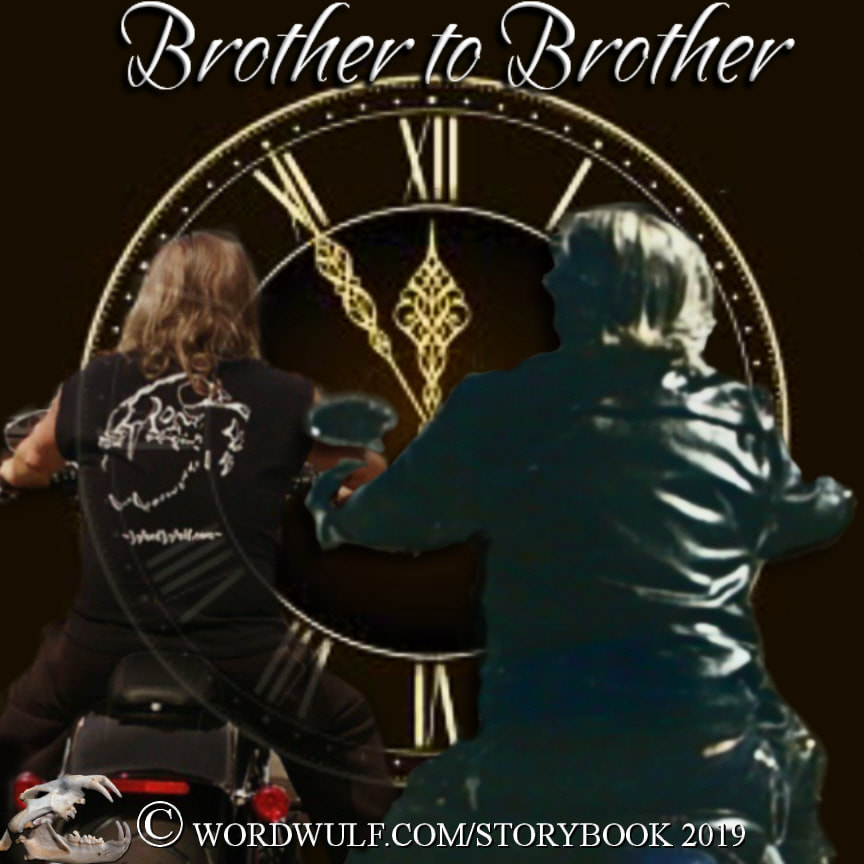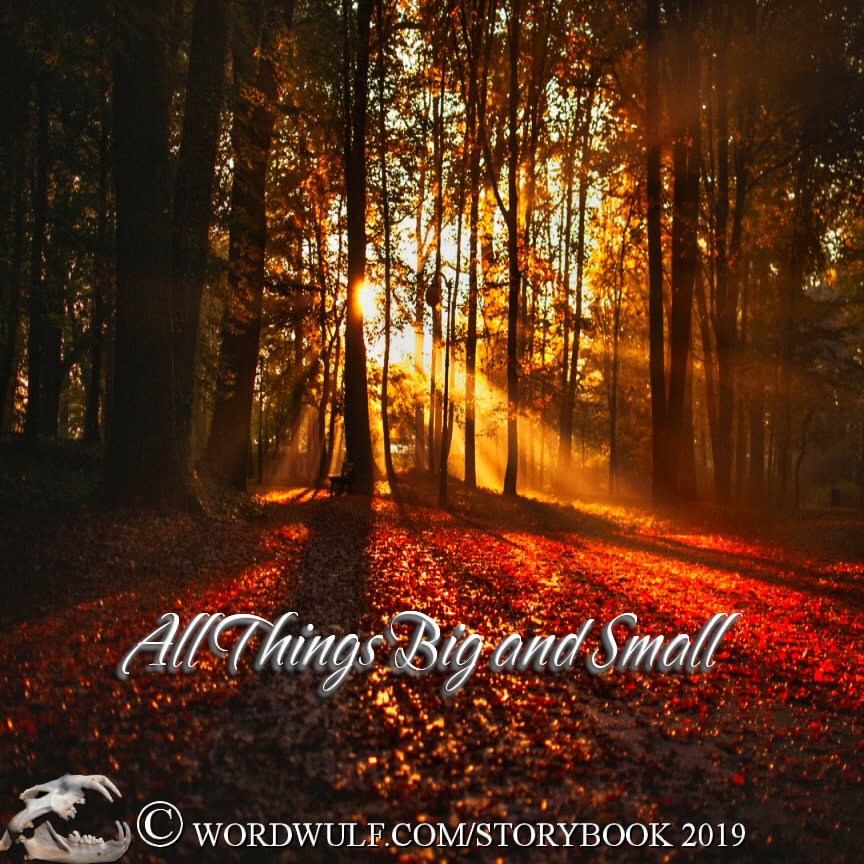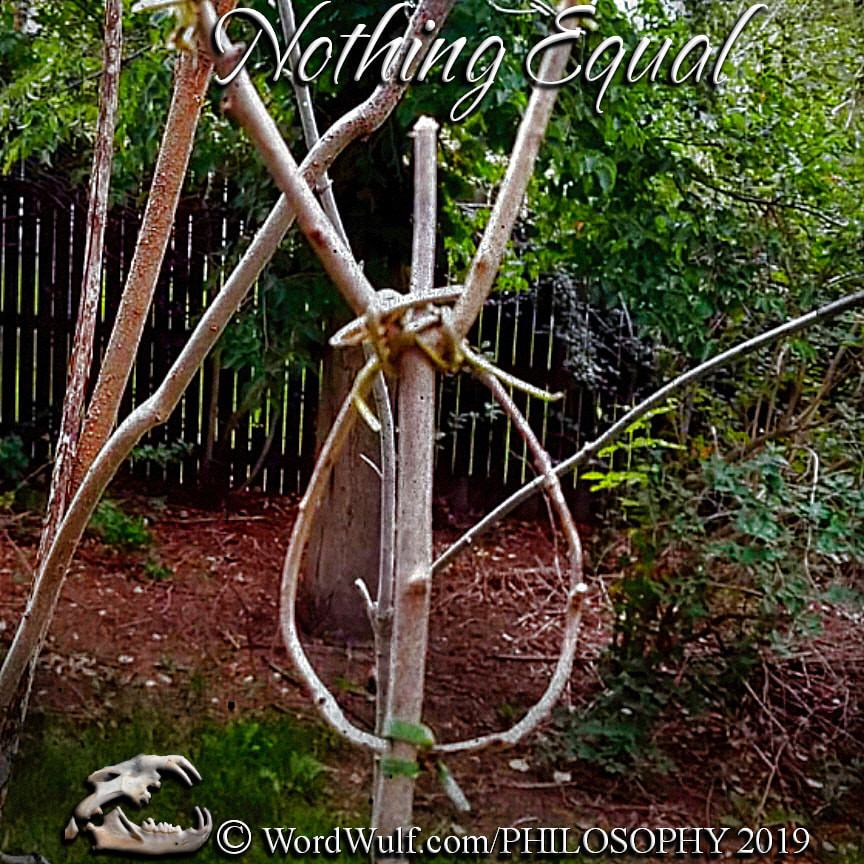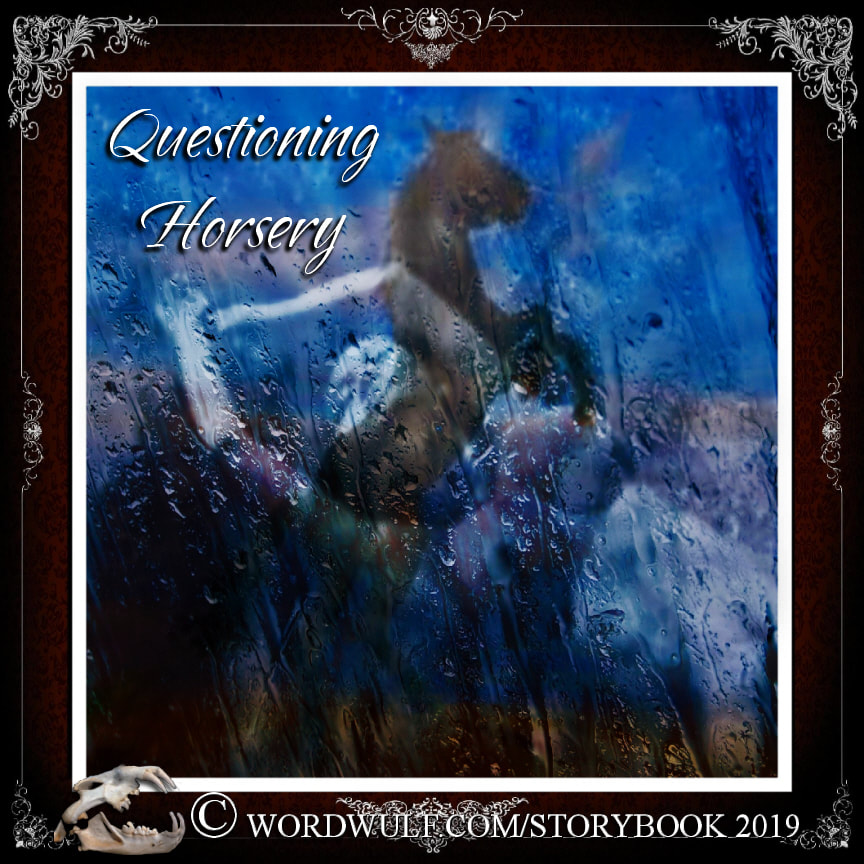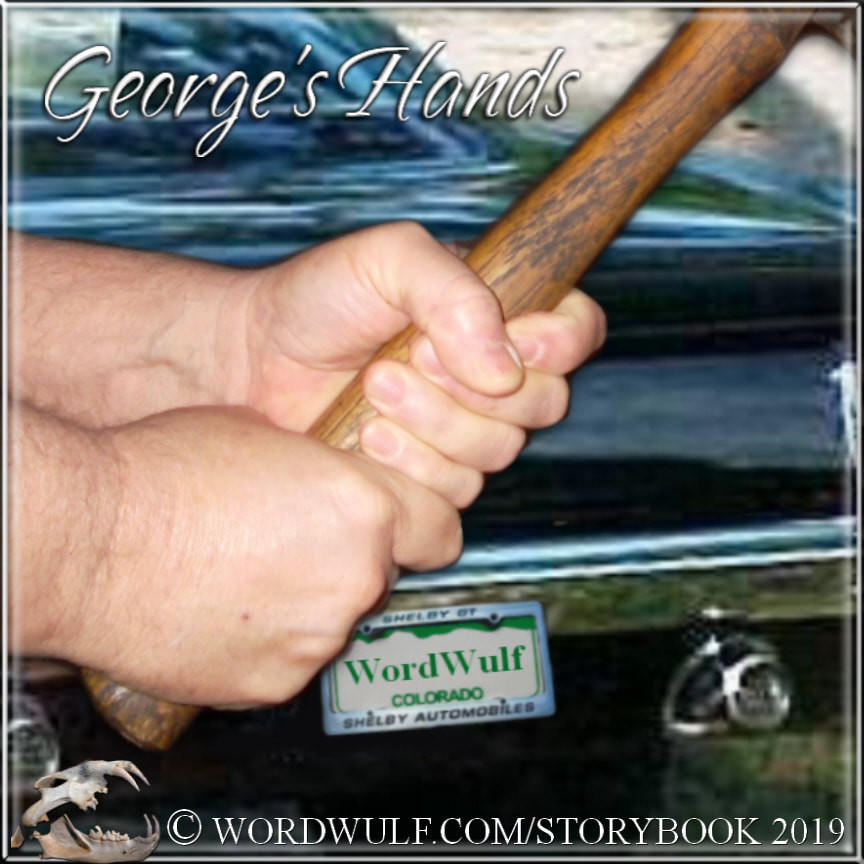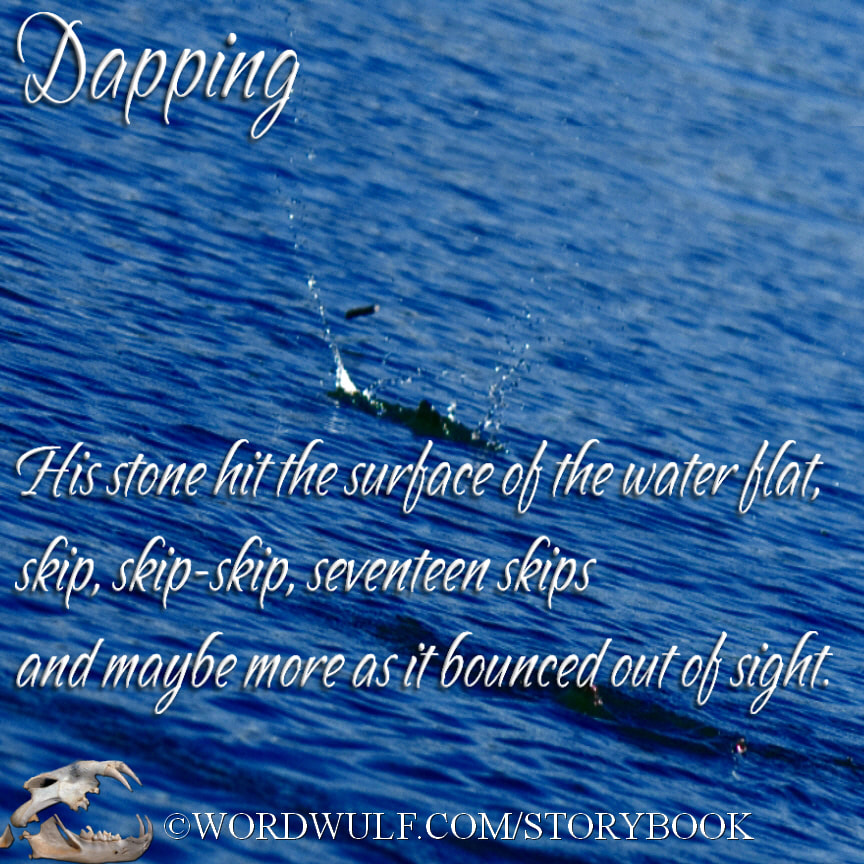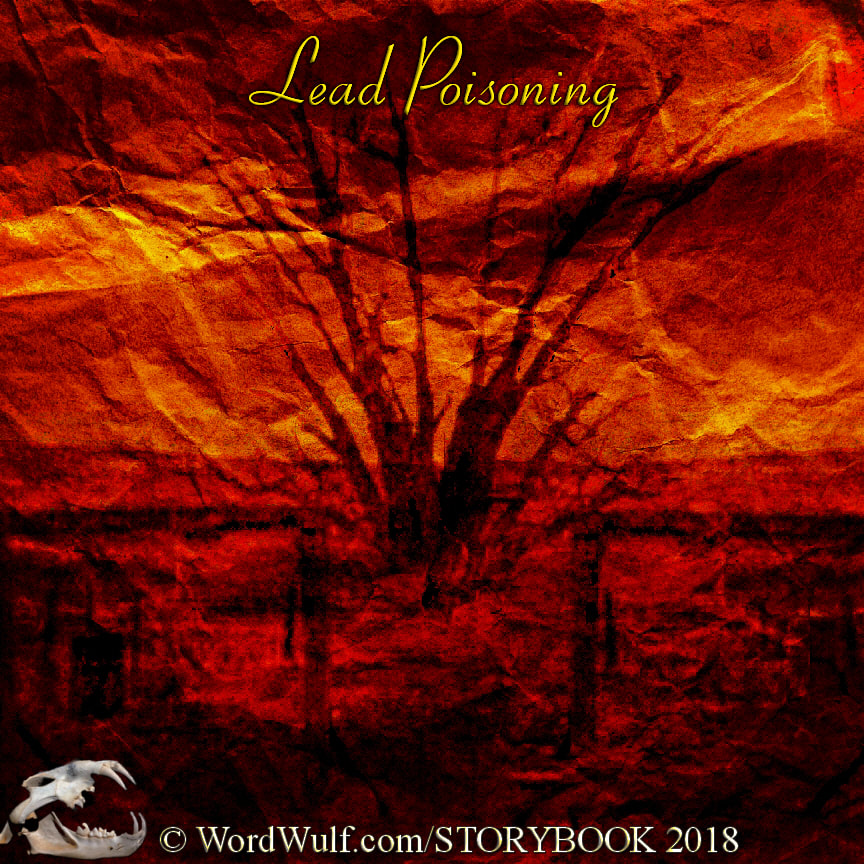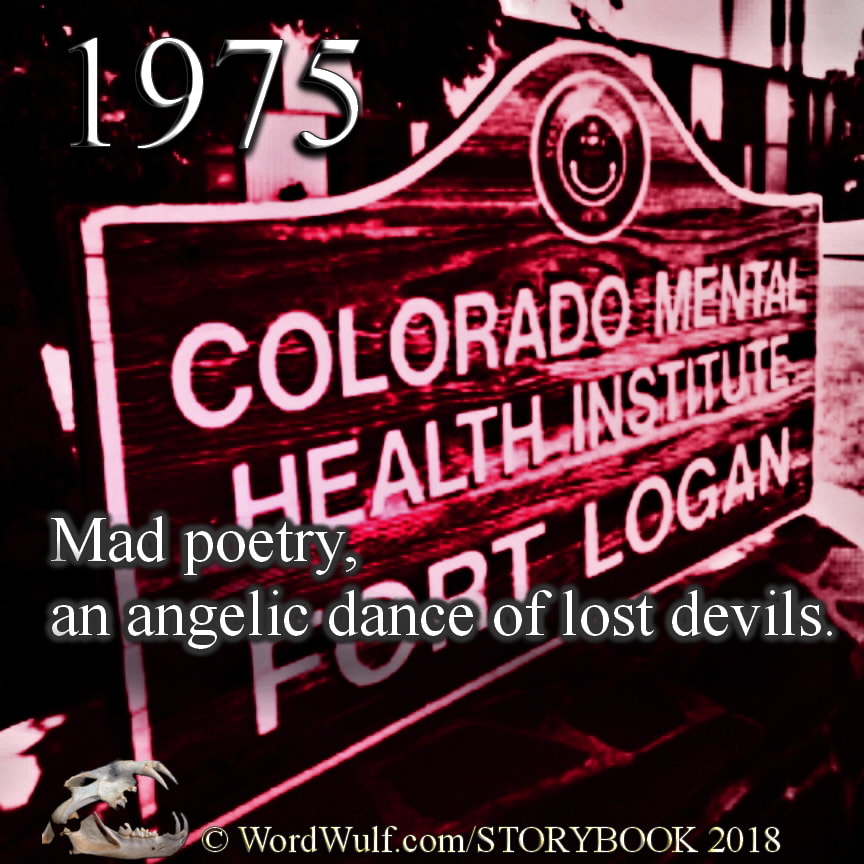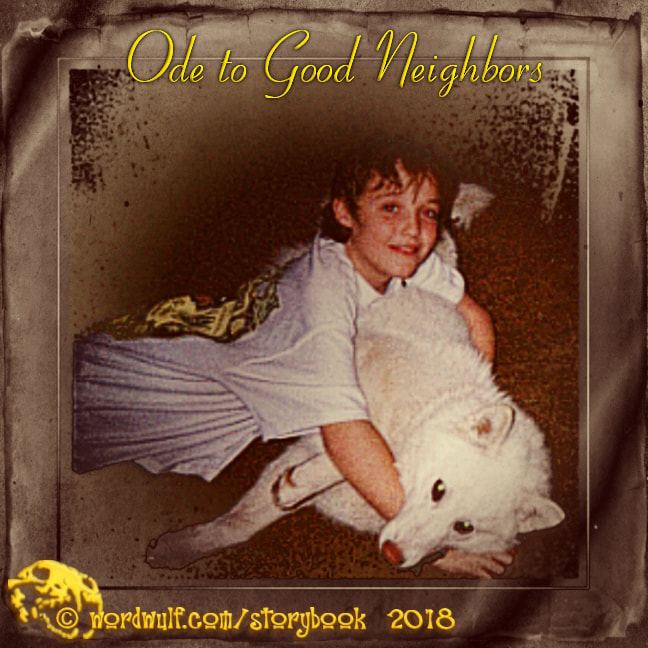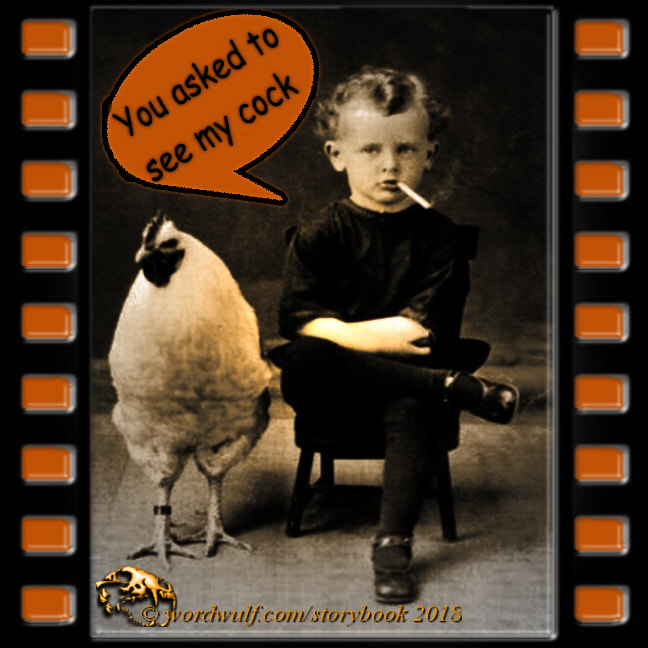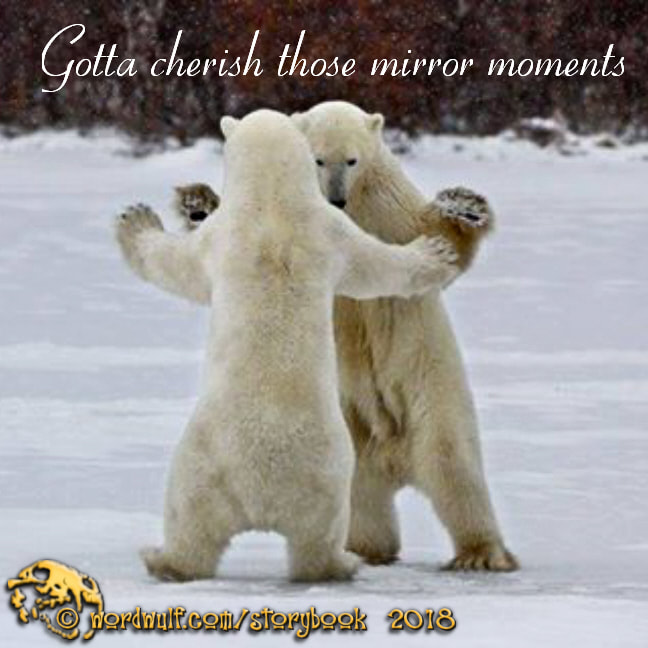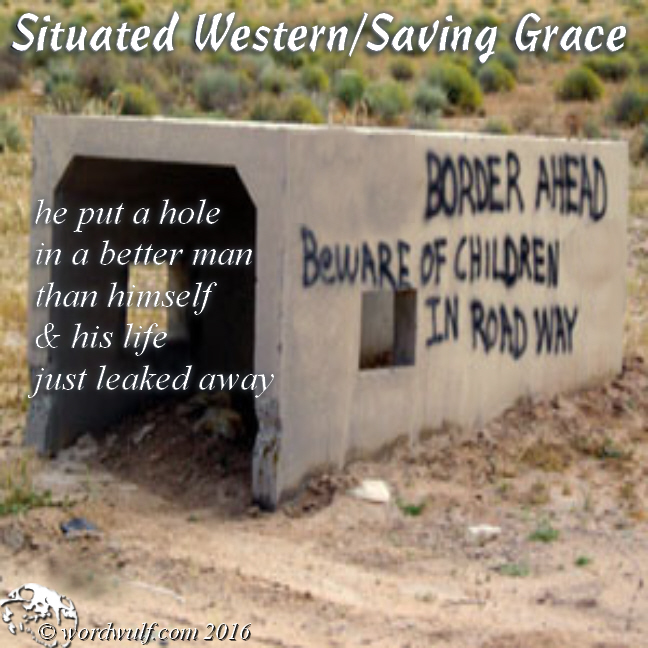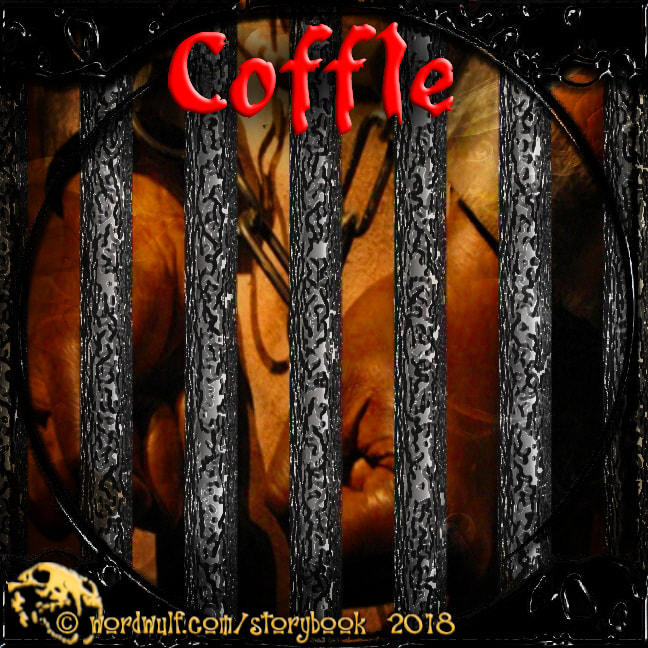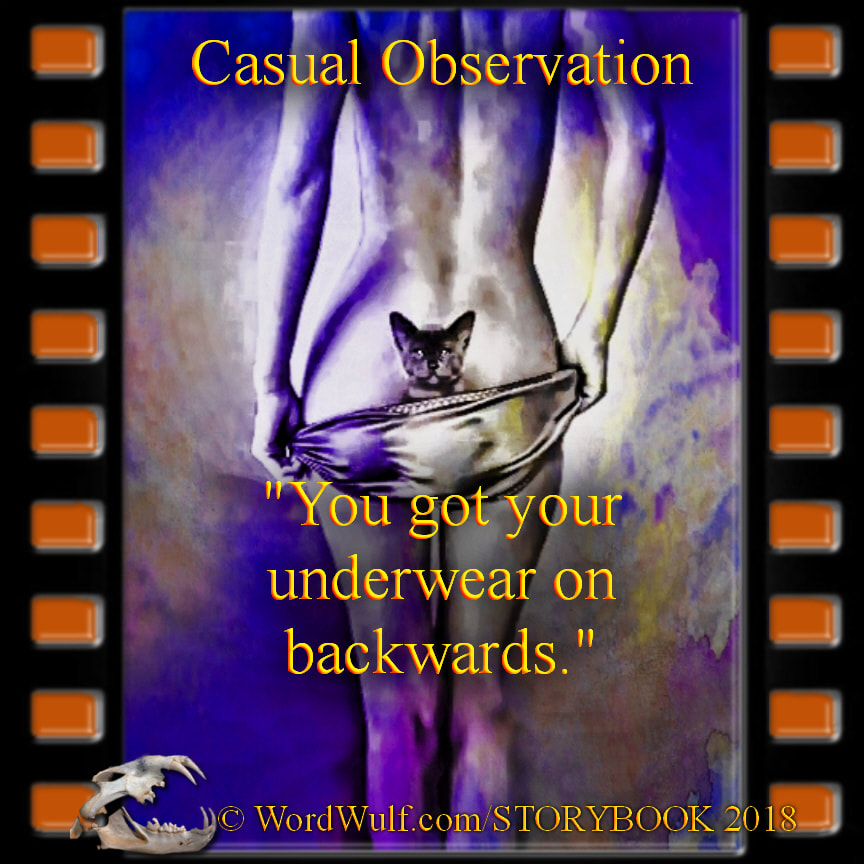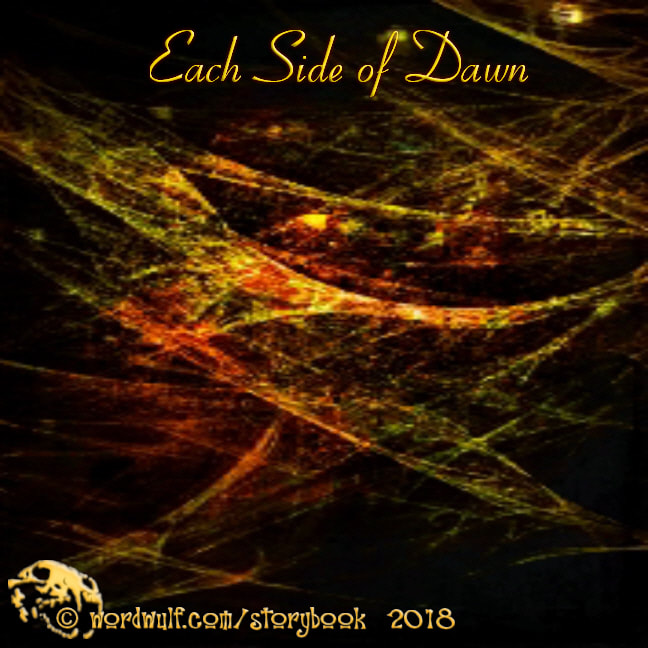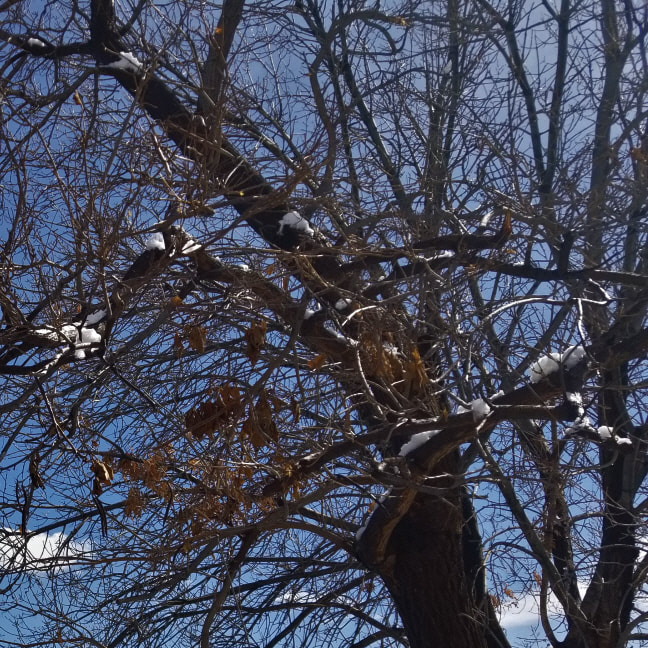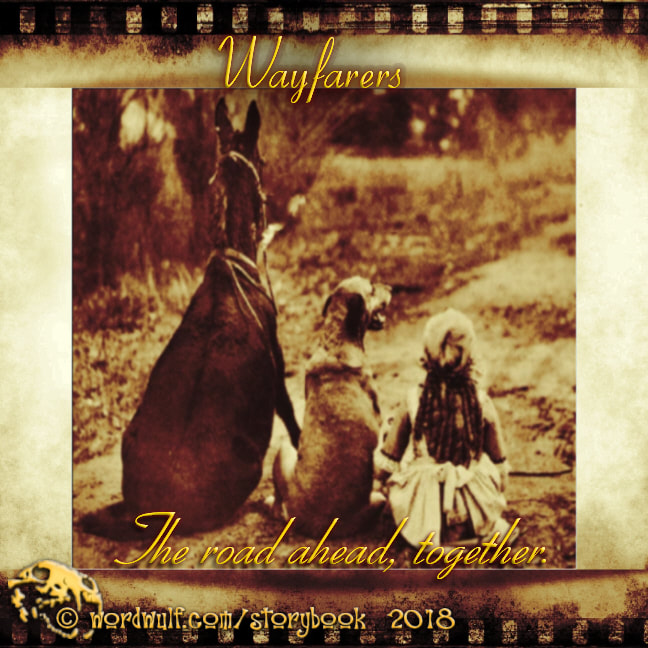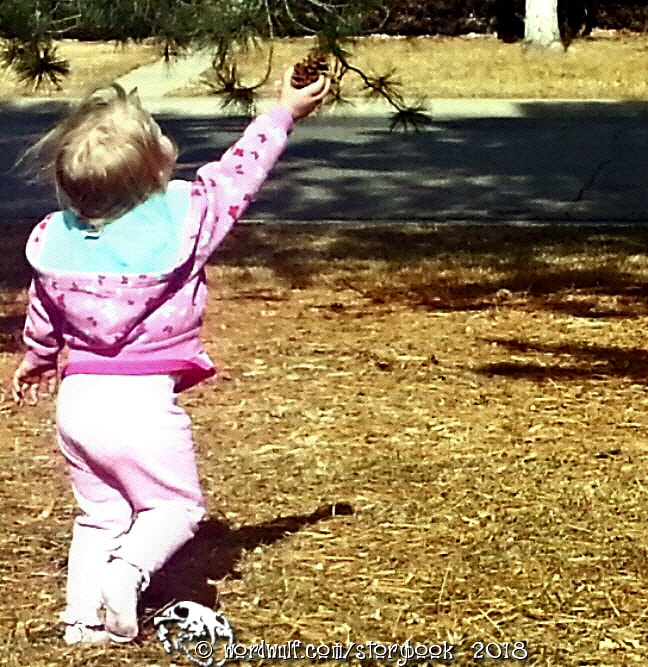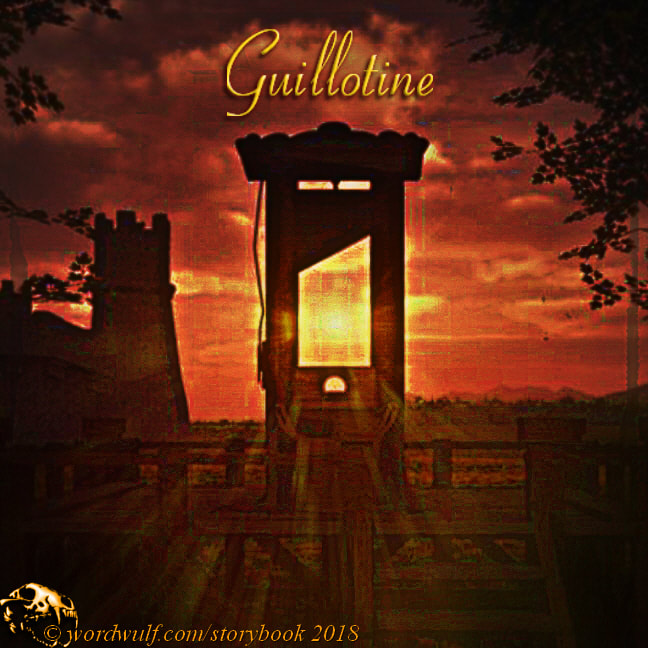When I look into your eyes, I see a rewind/fast-forward reflection of two small boys standing before the forest of their lives. A breath of wind and they are blown, hand in hand, into a storm of years. There is a flurry of fists and lips and angry eyes, tears, grief and separate joy as they pursue individual dreams, chase money and women, madness and music, the mystery of paths apart and alone.
When the smoke of time clears, there are two small boys wearing the faces of the men they have become. Their hands meet. They embrace, standing amidst the forest of their lives. A fresh wind holds them, whispering, “Blood is not brother, yet no friend is like a brother of the blood.
http://wordwulf.com
Inquiries: [email protected]
© 2019 artwork, music and words
conceived by and property of
Tom (WordWulf) Sterner 2019 ©
When the smoke of time clears, there are two small boys wearing the faces of the men they have become. Their hands meet. They embrace, standing amidst the forest of their lives. A fresh wind holds them, whispering, “Blood is not brother, yet no friend is like a brother of the blood.
http://wordwulf.com
Inquiries: [email protected]
© 2019 artwork, music and words
conceived by and property of
Tom (WordWulf) Sterner 2019 ©
The Autumn grass is browning, leaves scattered through its hair. The neighborhood tomcat ceases its strut, freezes in place, as bird shadows pass it on the sidewalk. Children’s voices echo down the early evening street of the neighborhood. Fathers and mothers are coming home from work, tires on the tarmac, car doors closing. The hum of the trees is swallowed in this early rush of evening but continues. Its life beat will soon own the deep space of night with its creatures’ voices. Mine is a man shadow eclipsed by the leafy bones of a tree, insignificant in the scheme, the what and where of all things big and small.
http://wordwulf.com
Inquiries: [email protected]
© 2019 artwork, music and words
conceived by and property of
Tom (WordWulf) Sterner 2019 ©
http://wordwulf.com
Inquiries: [email protected]
© 2019 artwork, music and words
conceived by and property of
Tom (WordWulf) Sterner 2019 ©
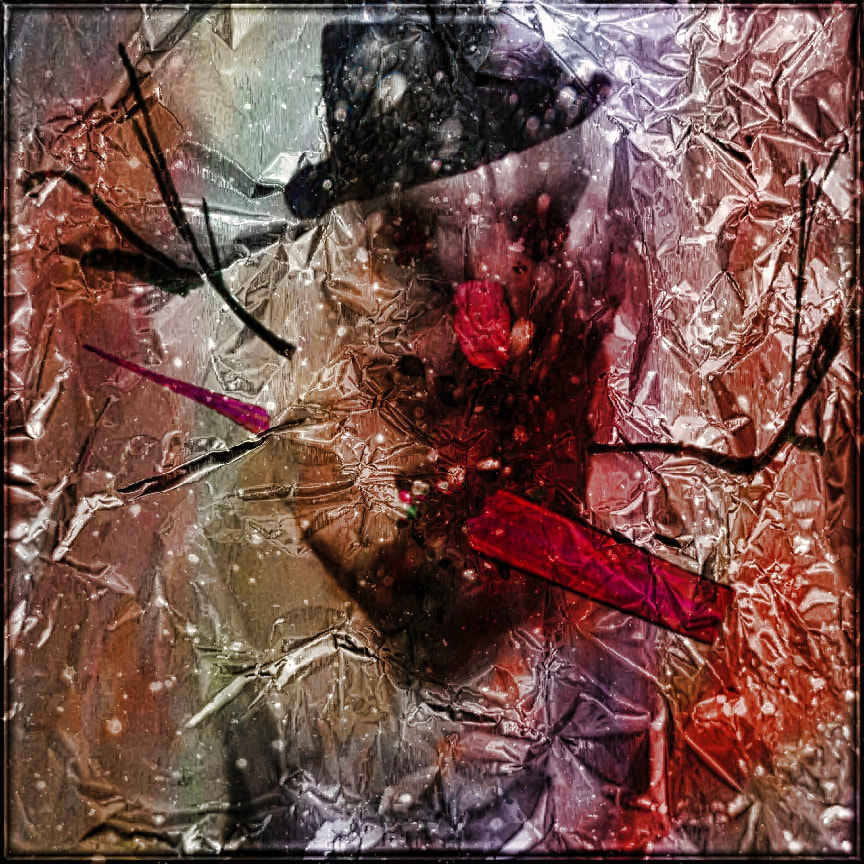 Montana Crow 9-21-2019
Montana Crow 9-21-2019
The boy enjoyed summer vacations at grandpa’s broken-down ranch, sitting on the porch with his .22 rifle across his lap. A crow in the corn; he raises the .22, drops it with a single shot, deader ‘n a stone. The old man comes running out of the house, drags the boy to the garden, “Look what you’ve done!” The boy cringes at the old man’s anger. “It was eating your corn, Grandpa.” The old man crumbles to the ground, a gentle caress, his hand smooth on the feathers of the bird, a sob in his voice. “You have killed my oldest and dearest friend, son. Sit down here with me, I wanna tell ya about the truth train.”
Truth Train
Montana Crow
Cold Montana, the outside edge of Billings, a slow train chug-chugging down the tracks. Boxcar graffiti, clickity-clack, devil spawn, death to Indians all, filthy, drunken bastards, slashes and symbols, curse words and signs.
The boy watching, squinted his eyes to better see and wonder if it was wrong to read a sin, to say. Would his punishment be the same if he confessed to reading and thinking, asked Momma what they meant, words painted evil on a passing train.
Kids should be seen, not heard, speak only when spoken to. A wayward tear, blink, ice tracks, winter war-paint on red cheeks. The boy’s grandfather was a half-breed, long dead. Momma said he was proud and ashamed to be the son of an Indian woman and white father.
Would the message on the rolling billboard have him slain wholly or in parts, the boy wondered. Daddy was a German. Were there people sending messages up and down the tracks suggesting those with German blood should be killed. He clapped his hands together, pleased that he could feel them, their fresh pain a sure sign they were clinging in defiance to the icy-ragged edge of life.
He walked in circles, the boy, round and round the bumpy driveway, projecting its rock-strewn winding shape into white mountain range miniatures, a crystal projection of change beneath and everywhere his dizzy shadow passed. The bare skin of a toe peeking
through a hole in the top of his shoe warned him wet just before the bank of the ditch.
The boy couldn’t swim. Then a carrion crow called his name, perched atop and feeding upon the putrid flesh of a rotting cow blocking the flow of the irrigation ditch, alive in a sense as mother dam to a pool of ice spreading and sustenance to the occasional wandering scavenger.
The boy gazed at the wet water freezing. What if he had skates like other kids. How sharp and deep are the blades. Considering the less than likely was a waste of time
Not now, the crow caw-cawed, blue black shining ebon orbs, its eyes seeing, reflecting
more of him than he was likely to see of himself, familiar and aware of the boy in a sense deeper and wider than human memory, instincts inherent, sensitive to danger. Unimaginative in its flight through life, infinitely gifted with no sense of death, brainless, mindless, wireless odds on, survival when a primordial switch is thrown, a scattered chaotic flash. The bird barked like a dog, its naked liver tongue, laughing hyena voice mocking.
The boy smiled his understanding, pleased to have been chosen pupil by the teacher, by the preacher come speaking the whys of dark things to a bright and promising neophyte,
fearful but curious and prepared to sample nuggets of knowledge buried cold and deep beyond the reach of bone and wing. Lesser angel, he bent down in the swirling snow
where it drifted and lay at rest, to test its density, the possibility of welding its parts together to make something quite different of it.
He laughed in his boy voice, whistled a tune, sang some of its words. Green Sleeves. The crow hop-hopped and cocked its head while the boy whistled through the first chorus, while he pushed the snow in a slow circling path through itself.
By the time he finished Green Sleeves, to his delight, the boy had created three good-sized (in his opinion) balls of snow.
Shiver freeze gone now, he had paid his due, received a blessed secret promise in an ancient mother tongue, a new language to him, safe and solitary in his keeping.
The crow performed a whistle mimic of the Green Sleeves tune, paying it forward, playing it back. The boy chuckled respectfully, fell backwards into the fresh white bed, hoping for, seeking an angel, exhaling freeze-breath gasps of mist.
The tortured corpse in its irrigation ditch grave, robbed of its vengeance, its reeking cloud of stench, by the certain, in your face, cold guns of winter. Its second death, final defeat, its carcass a pulpit to the strutting, dark-winged stranger speaking, the carrion crow dining, divining.
Vacancy sign flashing: motor court, fragile man-light hopelessly, powerlessly competing with the endless reach of Montana sky, obscure and diminished, blink-blink dead as noon slid by.
Tonight, the midnight would best it still with a vast battalion of stars led by the planetoid moon, second in charge, faithful parody, eager and duty-bound to its master to cast a reflection of the blazing inferno, the singular one, the sun but now, death in the window notes the crow to the boy.
The boy turned over carefully, got his pins under him calculatedly slow, dazzled by the ragged perfection, barren imperfection, his arms into wings, legs a gown, no halo etched
for a Montana winter snow-angel down.
Nickel-lie. Alas, my love, the boy’s voice was ringing, singing again, chanting its worth, remnants a part of one forlorn Native Amerikan tear, death to all Indians. The boy was aware in his weeping, afraid, ashamed and alone.
I wish someone would have saved us. He cried in a shrill child voice that once wore him then left him orphaned behind.
He dares a peek over the top of daddy’s old truck parked in front of the door, kitchenette #3. A quick glance and scan of the cracked black window where her face
I have loved you, oh so long.
was cut last night when daddy hit her. She went falling down.
delighting in your company
Daddy stopped and helped her up, pressed his fingers against her face
Go to bed
she said softly to her boy
and goodnight
He joined his brothers and sisters on the couch, feet to face to wiggly toes. He counted four and himself, shadow lumps, five, on the edge of light.
The husky sound of daddy’s voice cursing his luck, apologetic for having caused ‘the accident.’ The murmur sound of Momma lying down, her voice a quiet whisper.
It’s okay.
I know you’d never hurt me on purpose.
The frame of the bed tapping its rhythm slower at first then in sync with the country western radio.
Stand by your man
Galvanized rhythm, turbulent, ecstatic, urgent, needy and greedy.
The boy closed his eyes to the window, turned his head in hope to engage the crow. It was gone, having risen from its dead creature pulpit. He blinked his eyes. It was gone.
If I had wings and a song to sing
The boy’s voice was an octave deeper than in its previous plaintive tone, echoes vanished in ebony pearl eyes.
The boy had intended to build a snow fort. Something deeper than Montana, hoped his spirit. A fort would require many more balls of snow, the sacrifice of the body of his angel. No, snowman, me.
I have loved you, oh so long
He sang and maybe someone would notice someday. He’d buy an Elvis Cadillac for Momma. She’d be driving and laughing, taking her children away, bringing them home.
delighting in your company
The boy shaved ‘em round, his roly-poly balls of snow, stacked ‘em up. Frosty the snowman.
Digging stones for eyes, nose and mouth, difficult with indistinct feeling in his fingers. He realized he should stop, walk across the circle drive, past the window and through the door of #3.
Stand by your man
No. He was determined to finish, chase that song away. The snowman stared back at him
from awkward stone pointy eyes, a rotted carrot from the motel garbage nose. He pulled out one of its coal teeth, shoved it black and oily into his trouser pocket, stuck a cigarette butt in its mouth, took a step back, cast a dispassionate fixed stare upon his creation. The angel without a halo made sense but something was missing from the snowman.
The boy recalled, a few days ago, daddy had thrown one of his worn-out work hats away. He returned to scavenge the garbage where he’d found the carrot, sifted through three days of motel trash and found it. He crawled out of the trash bin with his prize, whacked it against his legs a couple of times to get off some of the chicken gizzard juice and grease.
He was pleased as he gazed upon the brutal scattered face of the snowman, out of sync, equal to frozen wild Montana. The boy decided to leave the face as it was. He wondered if an accident would make a face appear as wicked. He set daddy’s old hat on its head,
shivering and unsure of his footing, colder now and fiddling too much.
He couldn’t seem to get it right. Daddy wore his hat off to one side, cocky and down over his eyes. He got a firm two-handed grip on the brim of the hat, tugged it forward and to the left, down. There, it was perfect daddy. His hat turned the trick.
The boy used a single finger to carve out a heart in the snowman’s breast. He placed tiny stones around its edges. He walked over to the ditch, pulled a bloody fence slat from the dead body dam, turned in a circle, dizzy down next on one knee bent, planted a single ice skeleton kiss on the forehead of the angel. He rose to face the snowman whose hat it had become, plunged the verminous bloody sword, wooden, through the black of its icy heart.
The boy felt warm and alive in the safe embrace of the desolate bovine beast, grateful for its gift of sustenance, safe in its mother heat thawing wherever the boy’s flesh met hers. The cow in the ditch, safe in death, frostbite tingle toes and fingertips.
He’d have to go in pretty soon. Momma had to go to work, daddy to the bar. Creature ritual, he contemplated its shadow, the snowman approaching, stealing sunlight, displacing it dark and cold, when it reached his huddling form. He would go inside to babysit his siblings, hug Momma goodbye, hide the rusty old knife he had pulled from the carcass under the tutoring eyes of his mentor, the carrion crow.
The student would wait, respectfully, keen to learn to chase fear away.
http://wordwulf.com
Inquiries: [email protected]
© 2018 artwork, music and words
conceived by and property of
Tom (WordWulf) Sterner 2018 ©
Did you see the boys standing on the foreign soil of their homes shouting vindictive and threatening with stones as tanks rolled and ground their bodies, halftrack, a line of ladies, mothers in black, three coffins end-to-end, nothing equal to what is taken away.
I used to talk to dancers about gooseflesh and the stage, dollars on the table and meat by the nipple pound. I knew what they knew, my naked words, those whiskey rooms, America, nothing equal to what is taken away.
A brace of ravens, black cloud, rotor chop of metal birds, slick monster annoyance, ignorant radar screen blip-blip and come to save the day by slaughtering the innocent, nothing equal to what is taken away.
Too many dirges, the red man, whose blood favors my own, impaled on a spindle, totem to all things European cum American, an unholy spell cast on the East, thirst for her ebon/gold, oil/blood, nothing equal to what is taken away.
He stands weeping a father’s tears for the son who may never return. Pride of uniform, loyalty to flag, these swallowed in the fear and reality of the moment. What step this child makes whose hands, a father’s reach to grasp, nothing equal to what is taken away.
“Daddy, why do they make war on us?” but Daddy’s lips are dead. When the box is closed and lowered down, his daughter’s kisses are buried with him and any reason for sanity. Her young heart breaks, it just damn breaks. She wails against the digger, nothing equal to what is taken away.
Constantly at work, insatiable, conquerors. Is it Reptilian DNA, evil incarnate? The cold, icy blood of master conquerors marks the centuries and their willing slaves do a goose-step, a-one and a-two, over the bodies, metal clashing against metal, some way lifted, expanded by the line of dead, nothing equal to what is taken away.
Children, seek a forest where better creatures prowl and guard their lairs. You must learn to hide away, to at once remember and when the heat of those memories is too dark to bear, go inside. Learn to forget, learn to forget, nothing equal to what is taken away.
http://wordwulf.com
Inquiries: [email protected]
© 2019 artwork, music & words
conceived by & property of
Tom (WordWulf) Sterner 2019 ©
I used to talk to dancers about gooseflesh and the stage, dollars on the table and meat by the nipple pound. I knew what they knew, my naked words, those whiskey rooms, America, nothing equal to what is taken away.
A brace of ravens, black cloud, rotor chop of metal birds, slick monster annoyance, ignorant radar screen blip-blip and come to save the day by slaughtering the innocent, nothing equal to what is taken away.
Too many dirges, the red man, whose blood favors my own, impaled on a spindle, totem to all things European cum American, an unholy spell cast on the East, thirst for her ebon/gold, oil/blood, nothing equal to what is taken away.
He stands weeping a father’s tears for the son who may never return. Pride of uniform, loyalty to flag, these swallowed in the fear and reality of the moment. What step this child makes whose hands, a father’s reach to grasp, nothing equal to what is taken away.
“Daddy, why do they make war on us?” but Daddy’s lips are dead. When the box is closed and lowered down, his daughter’s kisses are buried with him and any reason for sanity. Her young heart breaks, it just damn breaks. She wails against the digger, nothing equal to what is taken away.
Constantly at work, insatiable, conquerors. Is it Reptilian DNA, evil incarnate? The cold, icy blood of master conquerors marks the centuries and their willing slaves do a goose-step, a-one and a-two, over the bodies, metal clashing against metal, some way lifted, expanded by the line of dead, nothing equal to what is taken away.
Children, seek a forest where better creatures prowl and guard their lairs. You must learn to hide away, to at once remember and when the heat of those memories is too dark to bear, go inside. Learn to forget, learn to forget, nothing equal to what is taken away.
http://wordwulf.com
Inquiries: [email protected]
© 2019 artwork, music & words
conceived by & property of
Tom (WordWulf) Sterner 2019 ©
Questioning Horsery
(Introduction to Grayson)
There were six million, three hundred fifty-two thousand, five hundred and eighty-three wavelets on her face this morning. She refused to be a victim of dawn tides, exalted in the event she was able to do so. Lying on the beach, body of sand, spirit air, mind spent and set aside, she fell into the waking side of a dream.
Three directions surrounding, vertical columns, fortresses of stone, up and through a lavender/pink firmament she stared. Eyes wide open, other than a hint of a smile wearing her lips, one might imagine her quite dead. Water tickling, gooseflesh wearing, the three-walled prison of her existence suited her fine. “How did I end up here?” The question threatened but she pushed it away. Stone mansion, earthen room, ocean door; she needed them and nothing more.
Startled by thunder, the incredible percussion of earth quaking, she closed her eyes. Not long though, this respite; she opened them just a bit, peered down across her body supine. Two rosebud nipples erect, extant reminders of her humanness, her flesh, met her gaze and pleased her. “I am woman.” She pushed the thought away.
They came to visit then, magnificent and marauding, a stallion and three mares, manes and tails flying, rays of Eos filtering, slices of dawn-light instantaneous, erected, broken, furious, wide-eyed and alive. Her arms, goddess tentacles, feathers lifting, rose from her sides to receive them. Mud silt exploded from their hooves, dappled her white-flesh, excited her nether regions to ecstasy, filled her with white-heat fantastic, orgasmic.
Body arched, wings supporting, she welcomed the tide, water caressing, purging her pinto/appaloosa and leaving her ivory/white. The stallion’s voice roared as he mounted the precipice, the armor of his limbs taut, aquiver, a single gasping breath, and Grayson let it all go. She watched the mares disappear into the clouds behind him and entertained the thought, considered her options, that she might just follow. But no, she smiled and pushed it all away.
http://wordwulf.com
Inquiries: [email protected]
© 2018 artwork, music and words
conceived by and property of
Tom (WordWulf) Sterner 2018 ©
(Introduction to Grayson)
There were six million, three hundred fifty-two thousand, five hundred and eighty-three wavelets on her face this morning. She refused to be a victim of dawn tides, exalted in the event she was able to do so. Lying on the beach, body of sand, spirit air, mind spent and set aside, she fell into the waking side of a dream.
Three directions surrounding, vertical columns, fortresses of stone, up and through a lavender/pink firmament she stared. Eyes wide open, other than a hint of a smile wearing her lips, one might imagine her quite dead. Water tickling, gooseflesh wearing, the three-walled prison of her existence suited her fine. “How did I end up here?” The question threatened but she pushed it away. Stone mansion, earthen room, ocean door; she needed them and nothing more.
Startled by thunder, the incredible percussion of earth quaking, she closed her eyes. Not long though, this respite; she opened them just a bit, peered down across her body supine. Two rosebud nipples erect, extant reminders of her humanness, her flesh, met her gaze and pleased her. “I am woman.” She pushed the thought away.
They came to visit then, magnificent and marauding, a stallion and three mares, manes and tails flying, rays of Eos filtering, slices of dawn-light instantaneous, erected, broken, furious, wide-eyed and alive. Her arms, goddess tentacles, feathers lifting, rose from her sides to receive them. Mud silt exploded from their hooves, dappled her white-flesh, excited her nether regions to ecstasy, filled her with white-heat fantastic, orgasmic.
Body arched, wings supporting, she welcomed the tide, water caressing, purging her pinto/appaloosa and leaving her ivory/white. The stallion’s voice roared as he mounted the precipice, the armor of his limbs taut, aquiver, a single gasping breath, and Grayson let it all go. She watched the mares disappear into the clouds behind him and entertained the thought, considered her options, that she might just follow. But no, she smiled and pushed it all away.
http://wordwulf.com
Inquiries: [email protected]
© 2018 artwork, music and words
conceived by and property of
Tom (WordWulf) Sterner 2018 ©
Larimer Street in Denver, it’s the hot place to be for the in-crowd these days, sports junkies, girls on the make. The haves pushed the have-nots out years ago. It was skid-row when I was a kid growing up. I liked it better then, spilled some blood there, not all of it my own.
George’s Hands
His knuckles were pushed back, swollen-looking in his huge hands whose fists had made him king of the Larimer Street Bars. Quiet and soft-spoken, he took this sixteen-year-old kid under his wing. I worked the yard with him at a scaffolding company. It was my first job and he was my boss.
George took me to the bars some Friday nights after work. The Yellow Cab would pick us up and drop us off in skid row downtown. When we walked into the bars loud voices hushed in respect. Madmen and wild women parted and made way for me and my gentle giant friend.
George put my hand to a wrench, taught me to drive the Case forklift, though he never drove a car and I asked him why. He swore me to secrecy then showed me a document from his wallet that stated his driver’s license was revoked for the remainder of his life for driving getaway cars from bank robberies in the thirties and forties.
Within a year I was George’s boss. He pushed me ahead of himself, told me I would be a man of words, that he was a man of hands. A year later, when George was fifty-six years old, his cigarette smoking and bar room brawling days caught up with him in a rush. It near broke my young heart to witness his gasping breath, its halting whoosh, as emphysema put him down.
I had helped George tag all his tools and wondered why he would paint them bright orange to separate them from the others in the shop. At seventeen-years-old, after my first pall bearing, George’s wife asked me to gather them up and bring them to her. When I brought them to her house she informed me he meant for me to keep them, every single one of them. They were many, amassed over twenty hardworking years. I loaded them back into the trunk of my hotrod Mustang, shed a tumble of hard-bitten tears. I have been haunted and blessed the all of my life by memories of George’s hands.
http://wordwulf.com
Inquiries: [email protected]
© 2019 artwork, music and words
conceived by and property of
Tom (WordWulf) Sterner 2019 ©
George’s Hands
His knuckles were pushed back, swollen-looking in his huge hands whose fists had made him king of the Larimer Street Bars. Quiet and soft-spoken, he took this sixteen-year-old kid under his wing. I worked the yard with him at a scaffolding company. It was my first job and he was my boss.
George took me to the bars some Friday nights after work. The Yellow Cab would pick us up and drop us off in skid row downtown. When we walked into the bars loud voices hushed in respect. Madmen and wild women parted and made way for me and my gentle giant friend.
George put my hand to a wrench, taught me to drive the Case forklift, though he never drove a car and I asked him why. He swore me to secrecy then showed me a document from his wallet that stated his driver’s license was revoked for the remainder of his life for driving getaway cars from bank robberies in the thirties and forties.
Within a year I was George’s boss. He pushed me ahead of himself, told me I would be a man of words, that he was a man of hands. A year later, when George was fifty-six years old, his cigarette smoking and bar room brawling days caught up with him in a rush. It near broke my young heart to witness his gasping breath, its halting whoosh, as emphysema put him down.
I had helped George tag all his tools and wondered why he would paint them bright orange to separate them from the others in the shop. At seventeen-years-old, after my first pall bearing, George’s wife asked me to gather them up and bring them to her. When I brought them to her house she informed me he meant for me to keep them, every single one of them. They were many, amassed over twenty hardworking years. I loaded them back into the trunk of my hotrod Mustang, shed a tumble of hard-bitten tears. I have been haunted and blessed the all of my life by memories of George’s hands.
http://wordwulf.com
Inquiries: [email protected]
© 2019 artwork, music and words
conceived by and property of
Tom (WordWulf) Sterner 2019 ©
The three brothers scoured the shoreline, carefully picking and choosing, culling, then met, each with a dozen special stones in his pocket. The oldest said to the youngest, “You’re the littlest, so you go first. Come on, give us somethin’ to shoot at!” The six-year-old took a deep breath, rared back and heaved a stone. Kerplunk. It fell a few feet in front of where he stood at the water’s edge.
Then the skinny boy with freckles, the middle brother, laughed and kissed the stone in his hand. “Lemme show ya how to do this!” He backed up half a dozen steps then ran to the water’s edge. His stone hit the surface of the water flat, skip, skip-skip, seventeen skips and maybe more as it bounced out of sight.
Zzzz-zt. The three boys stopped what they were doing and turned in the same direction as if their movements had been choreographed. They stared at a spot a short distance away where their fishing poles were propped on Y-shaped sticks stuck in the mud. The middle pole was bent over and, as they watched, went horizontal. Zzz-ip and it disappeared underneath the water. The boy with freckles dove in after it. “No!” the oldest boy yelled.
“No! No!” the smallest boy echoed. They watched wide-eyed as he followed the fishing pole under the muddy water.
The thin boy bobbed up a few yards out, then swam easily back to shore. He climbed out of the water and plopped himself down dejectedly on the ground. “Yer gonna get in trouble fer losin’ yer pole,” his younger brother warned, “Daddy says yer allays losin’ stuff!”
“Come on, you’d better pull yours in too,” the older brother interjected.
The youngest boy took his pole to hand. “I got somethin’ big ‘n heavy.”
“Oh, it’s a big ‘un!” the older brother exclaimed. “Reel mine in!” he said to the middle brother, “I gotta help him!”
The middle brother joined them. “Looka that,” his big brother laughed, “Looks like we both snagged your line.” Back in the water the skinny boy went but this time he came back with his pole. It took all three boys’ efforts to reel it in because there was a two-and-a-half-foot trout on the hook.
The boys cleaned, cooked, and ate that fish. No one would ever believe how big it was. They went back to dapping, lazing away the summer afternoon. The older brother, who always won, had his best throw, twenty-one skips.
The skinny boy topped that with a twenty-four. No matter what the boys did, the day was his. They are few and far between, those days, for the middle child and sweeter in the bargain.
http://wordwulf.com
Inquiries: [email protected]
© 2019 artwork, music and words
conceived by and property of
Tom (WordWulf) Sterner 2019 ©
Then the skinny boy with freckles, the middle brother, laughed and kissed the stone in his hand. “Lemme show ya how to do this!” He backed up half a dozen steps then ran to the water’s edge. His stone hit the surface of the water flat, skip, skip-skip, seventeen skips and maybe more as it bounced out of sight.
Zzzz-zt. The three boys stopped what they were doing and turned in the same direction as if their movements had been choreographed. They stared at a spot a short distance away where their fishing poles were propped on Y-shaped sticks stuck in the mud. The middle pole was bent over and, as they watched, went horizontal. Zzz-ip and it disappeared underneath the water. The boy with freckles dove in after it. “No!” the oldest boy yelled.
“No! No!” the smallest boy echoed. They watched wide-eyed as he followed the fishing pole under the muddy water.
The thin boy bobbed up a few yards out, then swam easily back to shore. He climbed out of the water and plopped himself down dejectedly on the ground. “Yer gonna get in trouble fer losin’ yer pole,” his younger brother warned, “Daddy says yer allays losin’ stuff!”
“Come on, you’d better pull yours in too,” the older brother interjected.
The youngest boy took his pole to hand. “I got somethin’ big ‘n heavy.”
“Oh, it’s a big ‘un!” the older brother exclaimed. “Reel mine in!” he said to the middle brother, “I gotta help him!”
The middle brother joined them. “Looka that,” his big brother laughed, “Looks like we both snagged your line.” Back in the water the skinny boy went but this time he came back with his pole. It took all three boys’ efforts to reel it in because there was a two-and-a-half-foot trout on the hook.
The boys cleaned, cooked, and ate that fish. No one would ever believe how big it was. They went back to dapping, lazing away the summer afternoon. The older brother, who always won, had his best throw, twenty-one skips.
The skinny boy topped that with a twenty-four. No matter what the boys did, the day was his. They are few and far between, those days, for the middle child and sweeter in the bargain.
http://wordwulf.com
Inquiries: [email protected]
© 2019 artwork, music and words
conceived by and property of
Tom (WordWulf) Sterner 2019 ©
Nights, I listen to my heart beat, float on its rhythm downriver, imagine what should have been and simple goddam wasn’t. Miss it anyway, make the voice of my mother with my spirit, talk to myself that way, like a dervish, like a dancer, perfection gone terribly awry, ogres making off with pieces of us.
Lead Poisoning
I’d like to thank my wife’s mother who I never met in this life for teaching her daughter the appropriate action to take when dealing with nuisances, remedies and recipes for destroying destroyers, as in sprinkling salt on meandering hordes of slugs, leech-ass clinging to the cat food dish.
And my own mother, in fact; while ranching with her in Wyoming, she taught me many things, not the least of which was how to conduct war on flocks of summer moths. She poured water into a small saucepan, mixed in dishwashing soap, tossed a dish towel over her shoulder, and advised me to watch closely. She stood on a kitchen chair, held soapy water under the ceiling light, swooped at the moths with her dish towel. They fell down, drowned in layers.
I went over one morning to have coffee with Momma and my stepdad. She was sitting at the table weeping. He was out riding fence. Momma lifted my four-year-old son into her lap, held him near to her breast, when he asked her where Lady and Snoopy were. They were pets brought from the city when my stepdad purchased the ranch.
Snoopy was a loveable Siberian Husky with a hair lip, one blue eye and one brown. Lady was a red Alaskan Malamute. Snoopy followed her everywhere. She was a year older and half again his size. Lady took care of my boy. Many a time I was busy with chores, turned around to say something to that little guy and he wasn’t there. He did that things kids do, disappeared into thin air.
There were wells and holes and rattlesnakes, a thirty-foot high slab pile full of black widow spiders outside a dilapidated sawmill/barn. I went near crazy looking for that boy at times. Out there in the endless fields one day, hay and alfalfa, lavender yellow, I followed those curled Husky’s tails meandering through the rows. I found Lady herding my boy back to the house, keeping him safe, bringing him home, Snoopy close on her heels.
There was a lot for a father to worry about on that red dirt, dry-assed Wyoming ranch, cows out, broken fences, sixteen-hour work days seven days a week, the never-ending demands of the hard-boss, my stepfather. Lady gave me peace and assurance that whatever hole I fell into my boy was safe with her.
Momma was weeping. “Give me a minute,” she sobbed. Momma wasn’t a crier. I watched her closely, Momma’s hand on that coffee cup, as I poured myself some and took a seat at the table, her arms around my boy. She took a sip, set her cup down slow and easy. “Remember when the dogs were chasing the cows?” She looked across the table at me, her eyes chocolate brown, deep and moist, bottomless.
“A couple of weeks ago,” I replied, “What?”
“Do you remember what he said?”
“He said they can’t do that. It distresses the cows. They’re ready to calve.”
She nodded sadly. “Yes, and the lead poisoning.”
I ran my fingers through my beard. “Hell Momma, he says some weird-assed shit. That ‘lead poisoning dogs and cows business’ didn’t make a connection with me but I didn’t want to hear any more about it so what the hell…”
“That porcupine the dogs kept chasing,” she mused, “It died of lead poisoning.”
I nodded my head. “That was something. Never occurred to me a creature could get so many quills in its face. They whimpered and cried like little babies while I sat on ‘em and he pulled the quills out with pliers. Seven days in a row, they’d go find that damned thing and go after it again.”
“He shot that porcupine dead,” Momma said.
“Hell of a shot,” I agreed. “A hundred yards away, that porcupine dropped dead off that telephone pole before we heard the report of the rifle. Can’t say I felt sorry for it, all the pain and work it put us through.”
Momma hugged my boy tight, buried her face in his hair.
“The dogs chased his calves last night,” she whispered, “lead poisoning.”
http://wordwulf.com
Inquiries: [email protected]
© 2018 artwork, music and words
conceived by and property of
Tom (WordWulf) Sterner 2018 ©
Lead Poisoning
I’d like to thank my wife’s mother who I never met in this life for teaching her daughter the appropriate action to take when dealing with nuisances, remedies and recipes for destroying destroyers, as in sprinkling salt on meandering hordes of slugs, leech-ass clinging to the cat food dish.
And my own mother, in fact; while ranching with her in Wyoming, she taught me many things, not the least of which was how to conduct war on flocks of summer moths. She poured water into a small saucepan, mixed in dishwashing soap, tossed a dish towel over her shoulder, and advised me to watch closely. She stood on a kitchen chair, held soapy water under the ceiling light, swooped at the moths with her dish towel. They fell down, drowned in layers.
I went over one morning to have coffee with Momma and my stepdad. She was sitting at the table weeping. He was out riding fence. Momma lifted my four-year-old son into her lap, held him near to her breast, when he asked her where Lady and Snoopy were. They were pets brought from the city when my stepdad purchased the ranch.
Snoopy was a loveable Siberian Husky with a hair lip, one blue eye and one brown. Lady was a red Alaskan Malamute. Snoopy followed her everywhere. She was a year older and half again his size. Lady took care of my boy. Many a time I was busy with chores, turned around to say something to that little guy and he wasn’t there. He did that things kids do, disappeared into thin air.
There were wells and holes and rattlesnakes, a thirty-foot high slab pile full of black widow spiders outside a dilapidated sawmill/barn. I went near crazy looking for that boy at times. Out there in the endless fields one day, hay and alfalfa, lavender yellow, I followed those curled Husky’s tails meandering through the rows. I found Lady herding my boy back to the house, keeping him safe, bringing him home, Snoopy close on her heels.
There was a lot for a father to worry about on that red dirt, dry-assed Wyoming ranch, cows out, broken fences, sixteen-hour work days seven days a week, the never-ending demands of the hard-boss, my stepfather. Lady gave me peace and assurance that whatever hole I fell into my boy was safe with her.
Momma was weeping. “Give me a minute,” she sobbed. Momma wasn’t a crier. I watched her closely, Momma’s hand on that coffee cup, as I poured myself some and took a seat at the table, her arms around my boy. She took a sip, set her cup down slow and easy. “Remember when the dogs were chasing the cows?” She looked across the table at me, her eyes chocolate brown, deep and moist, bottomless.
“A couple of weeks ago,” I replied, “What?”
“Do you remember what he said?”
“He said they can’t do that. It distresses the cows. They’re ready to calve.”
She nodded sadly. “Yes, and the lead poisoning.”
I ran my fingers through my beard. “Hell Momma, he says some weird-assed shit. That ‘lead poisoning dogs and cows business’ didn’t make a connection with me but I didn’t want to hear any more about it so what the hell…”
“That porcupine the dogs kept chasing,” she mused, “It died of lead poisoning.”
I nodded my head. “That was something. Never occurred to me a creature could get so many quills in its face. They whimpered and cried like little babies while I sat on ‘em and he pulled the quills out with pliers. Seven days in a row, they’d go find that damned thing and go after it again.”
“He shot that porcupine dead,” Momma said.
“Hell of a shot,” I agreed. “A hundred yards away, that porcupine dropped dead off that telephone pole before we heard the report of the rifle. Can’t say I felt sorry for it, all the pain and work it put us through.”
Momma hugged my boy tight, buried her face in his hair.
“The dogs chased his calves last night,” she whispered, “lead poisoning.”
http://wordwulf.com
Inquiries: [email protected]
© 2018 artwork, music and words
conceived by and property of
Tom (WordWulf) Sterner 2018 ©
Dear Santa,
I’m too old to be writin’ you these letters. Truth is, I’ll be 9 in a few months and I been thinkin’ for a while that you ain’t real. But just in case you are there’s this cool chopper bike at Wal~Mart I’d like to have. My l’il sister Lily wants a Cabbage Patch doll (she likes cat things too and race cars). She’s 7. My brother Louie is 6. Louie’s just about crazy for fire trucks. The smallest of the Lanes is baby Lisa. She’s 1 and a half. She likes those ol’ dolls with the blinky eyes (sometimes she pokes ‘em out).
Like I said before, if you’re too busy or you ain’t real, just forget about this letter. I’m gettin’ so old it’s probly the last one you’ll get from me. Seems to me like good ‘n bad don’t have as much to do with presents as Daddy’s job. When he has work you always bring lots o’ stuff. When he don’t, you don’t.
Santa, he ain’t been workin’ much at all this year. His foot got hurt and he started takin’ pills then the doctor wouldn’t give him no more but it still hurt a lot. Well he started drinkin’ whiskey and beer and him and Mommy took to fightin’ all the time. She cries a lot and that makes my l’il brother and sisters cry. I try to wait and do it by myself when nobody can see me. If you pray Santa could you say one for Larry and Laurie and Lonnie (that’s me) and Lily and Louie and baby Lisa? Yeah that’s us the L Family. Kids in school use to tease me ‘bout the L’s and I’d get mad at Mommy and Daddy for namin’ the whole Family like that. Lately I been writin’ our names down in a row over ‘n over and now I think maybe it’s kinda neat that they got together and decided to have all us l’il L’s.
And that’s my real wish Santa. That Mommy ‘n Daddy’ll be like they use to. Never mind the bike and toys. Maybe if you’re real you could get together with god or somethin’ and sort o’ teach ‘em to smile again like they use to at each other and us kids. I know it sounds sappy and I use to hide my eyes when I was a kid so I didn’t have to watch ‘em makin’ eyes at each other and kissin’ ‘n stuff.
Well, I’ll let you go for now. You probly won’t hear from me no more since I’m gettin’ so old now.
Your Friend
(if you’re real or not)
Lonnie Lane
Laurie waited until after ten o’clock like she had each Christmas for the past eight years. She went to the Children’s rooms, nibbled at the snacks and sipped the juice they left out for Santa. Her hand trembled a bit as she wrote, “Ho! Ho! Ho! See you next year! Be good boys and girls!” on the backside of some leftover Christmas wrap. She wiped a tear from her cheek as she picked up Lonnie’s letter to Santa and replaced it with her Santa reply. This was the thinnest Christmas ever, barebones and nothing left over. She’d managed to scrimp and save to buy gifts for each of the younger children but the bicycle Lonnie longed for, any bike for that matter, just plain cost too much. If only Larry could find work.
Larry had a warm fire going in the fireplace and was getting ice cubes from the fridge when she returned from visiting the Children. “Want a nightcap, Honey?”
Laurie bit her lip. “Just one and make it light. Come on in the living room and read Lonnie’s letter to Santa with me.”
Larry laughed derisively. “Isn’t he getting a little old to be writing letters to Santa? If he hopes to realize his dream to be a writer someday, just like Jack London, he’d better start writin’ somethin’ stronger ‘n letters to Santa. Not much power in Santa notes.” He finished preparing the drinks and went to sit with Laurie on the sofa. She sobbed into her drink and handed him the letter.
He put an arm around her shoulders. “Don’t cry, Sweetheart. Next year’ll be better for us. I’ll straighten up and fly right, I promise. I don’t know what’s gotten into me.” He paused and sipped his drink. “If I could just find work.”
Laurie turned toward him, teary eyed. “Just read Lonnie’s letter, Larry.”
Larry bent forward, using the glow from the fireplace to light up his oldest Child’s words. “Ah damn me damn,” he said when he finished reading the letter. He stood up and kissed the top of Laurie’s head, “I’ll be back.”
He got up from the sofa, grabbed his coat, and headed for the door. “Please don’t go to the bar tonight,” Laurie said as the front door closed behind him. She heard his truck start, held her face in her hands and wept.
Larry drove his old Ford pickup into the parking lot of a local neighborhood bar, the Silver Dollar Bar and Grill. Other than his pickup, there was only one vehicle in the lot, a ten-year-old Cadillac Deville. He got out of his pickup and entered the back door of the bar. It was dimly lit except for the serving window to the kitchen which was just to the right of the door.
“Hello, anybody home?” Larry called back toward the kitchen.
A short Italian man stepped from the kitchen rubbing his hands together. “Larry, my friend, what brings you out on Christmas eve? Can I make you a sausage sandwich? How ‘bout a drink?”
“Merry Christmas, Papa,” Larry said. “Your boy, Michael, said he might be able to line me up with some side work, a drywall job, something like that.”
“Me and Mama, we told that boy of ours to stay home with the wife and kids. Mikey’s having us over tomorrow. How ‘bout you and the wife and all your little ones; you have big plans for the holiday?”
“Just the six of us this year,” Larry replied. He glanced toward the door. “Hey, I better get going. You have a nice Christmas. Tell Michael I’ll call or come by day after tomorrow.”
“You too, Larry. I’ll tell Mikey.” His brow wrinkled concernedly as he watched Larry walk out the door.
“Come on, Mama,” he said through the serving window. “Let’s call it a day, lock up and go home.”
Larry sat in his Ford in the parking lot, waved at his friend’s parents when they came out and climbed into the Cadillac. When they pulled out onto the street, he turned on the interior light and started to reread Lonnie’s letter to Santa.
Just as he began to read it, someone rapped on the window of his truck. Startled, Larry yelped, “What?”
Seeing a badge and police uniform, he fumbled with the window and finally managed to compose himself and roll it down. There was a female uniformed cop with a flashlight standing just outside the door. She shined the light into the cab, across the seat and dashboard, stopped and held it just above Larry’s chin. “Are you okay, sir?”
Larry folded the letter, put it back in his shirt pocket. “I’m okay. How’re you tonight?”
The cop pursed her lips. “I need to see your driver’s license, proof of insurance, and registration, please.”
Larry leaned forward to retrieve his billfold from his rear pocket. He was fidgeting, nervous and distracted. “I was just sitting here reading a Christmas letter from my son.” He located the documentation and handed it to her.
She glanced at them under the beam of her flashlight then returned the focus of the beam to his lower face. “Sit still, sir. I’ll be right back.”
She headed back to her car. Larry glanced in the mirror. The red and blue flashing lights were all he could see. “What the hell now?” he muttered to himself.
He willed himself to relax, rested his head on the truck seat. He closed his eyes, felt himself falling, stared up into the lights of a surgery room. His leg is mangled and the pain, it is unbearable. Morphine helps. Everything is better now, isn’t it, Larry?”
“Have you been drinking tonight, Mister Lane?”
There she was with her light again. Larry, startled from his reverie, “No Sir, I mean Ma’am.”
She shined the light in his eyes and took a step back. “Step from the vehicle, please.”
Larry got out of the truck and she moved to the front of it. “Please face your vehicle. Stand with your feet apart, hands on the hood.”
Larry did as he was told and she, quick and professional, frisked him top to bottom then stepped back. “Turn around now, Mister Lane.”
Larry turned to face her, nervous and agitated, fighting to control his frustration and temper. “I just stopped by here to see a friend about some work. I haven’t been drinking or anything. I..”
She held up her hand in a signal for him to stop speaking. “I haven’t accused you of anything,” she said tersely. “Stand up as straight as possible and touch the tip of your nose with your right hand, sir.”
Larry was visibly upset but did as he wass told.
She was watching him closely. “Drop your right arm to your side. Keep it there and touch the tip of your nose with your left hand.”
Larry touched the tip of his nose and she took a few steps back. “Walk in a straight line toward me, one foot in front of the other. When I raise my arm, turn around and walk back to your vehicle.”
Larry walked toward her, turned around and walked back to his pickup when she raised her hand. He turned around to face her. “Well?”
She rubbed her hand on her chin. “You did okay with the nose part. You didn’t walk very straight though.”
Larry leaned against the rearview mirror of his pickup. “I had an accident at work a little over a year ago. Broke my foot and leg in a number of places. Doubt I’ll ever walk straight again.”
She nodded her head. “Will you consent to a blood or breath analyzer?”
Larry sighed defeatedly. “If that’s what I have to do. Listen lady, my oldest son wants a bike. I got fifty dollars in my pocket and I’m hoping Wal~Mart is open so I can go try to talk them out of one for fifty bucks. I’m not sure they’ll stay open all night, it being Christmas eve.”
She turned off the flashlight, slipped it into the loop on her Sam Browne. “Good luck with that.”
She approached Larry, handed him his paperwork, surprised him when she squeezed his shoulder. “Go get that bicycle, Mister Lane. And hey, Merry Christmas.”
Larry, out of sorts and befuddled, said, “Thanks and Merry Christmas to you.”
She opened the door and Larry added, “Hey, it’s been a tough year but I’m gonna get that bicycle for my boy.”
He climbed into his pickup, took out his billfold, and put the paperwork away. He pulled a fifty-dollar bill from behind a flap in the billfold, held it up and gave it a kiss. “My rat-hole.” He returned the billfold to his back jeans pocket, put the bill in his front pocket, started the pickup and pulled out onto the street.
Larry drove directly to the nearest super Wal~Mart, thankful they stayed open late. The bike rack was near the front of the store and he marched straight to it. “May I help you?” asked a blue-vested clerk.
“I hope so,” Larry replied in earnest. “My son wants one of those chopper bikes for Christmas. I probably don’t have enough money to buy it but maybe I can work out somethin’ with the manager of the store to make up the difference. I’ll shovel snow, sweep the floor, unload trucks, anything. I gotta have that bike for my boy.”
“I’m sorry, Sir,” the lady said. “Those bikes were a big hit this season. All our stores have been sold out for over two weeks.”
Larry stared at her in disbelief. Tears filled his eyes. “I told you I’d work. I’ll do anything; if you could just.”
His desperation startled the clerk. She edged away, offered him a nervous smile. “I’ll get the manager,” she said consolingly, “Maybe there’s something he can do to help you.”
Larry paced back and forth but felt relieved when the store manager appeared a few moments later. He shook Larry’s hand and gave him an appraising look. “Good evening, Sir. Liesel told me about your problem and asked me to have a word with you.”
“Liesel?” Larry mumbled, “L, L. Liesel, L’s on both ends?”
The manager laughed heartily and Larry was taken aback at the portly man’s gaiety. He was middle-aged or older, had a full white beard and twinkling eyes and for a moment Larry thought, but no… Stop it! Larry chastised himself, this is the real world, not some eight-year-old’s fairy tale fantasy. “Sorry for my outburst,” the jolly man said, “But your response struck me as funny. Of course, Liesel has L’s on each end of her name.”
Larry smiled a sad smile, the best he could muster under the circumstances. “Guess I got a thing for L’s.” His smile went a bit deeper, became more genuine. “Life and love, my whole Family; L’s have been kind to me.”
“My name’s Nick,” the manager said, not sure what to make of Larry’s statement. He scrutinized Larry for a short moment. “And hey, about the bicycle; I have one in back that was damaged in shipment or something. I don’t remember precisely what happened to it. There was something wrong with it that was fixable but we don’t have the resources here, time, machinery, a welder, something like that. We planned to claims it out after the holiday and take it to a recycling facility with other damaged merchandise. Mind you, if it appears beyond repair, I won’t be able to sell it to you.” Having said that, he turned on his heel and headed for the back of the store. “Come along; let’s see what we can do for you.”
Larry followed close behind, hands in the pockets of his jeans. He worried the fifty-dollar bill there, his stash, with his fingers and in his mind. What if it wasn’t enough like countless other things this past year that hadn’t been enough; like Larry himself wasn’t enough anymore, his self-esteem at an all-time low.
‘Here we go!” Nick announced while jingling through a ring of keys. He tried a couple and finally found one which unlocked a large metal door that led to a chain-link cage outside the rear of the store.
“Lot o’ stuff,” Larry commented as Nick flipped on a light. “Everything out here damaged?”
“Pretty much,” Nick replied, “Oh, there it is, over in the corner.” He started down an aisle littered with the miscellaneous debris of broken and damaged merchandise. “Wait by the door; I’ll pull ‘er out and we’ll have us a look-see.”
Nick moved some boxes, then returned up the aisle, pushing a bicycle with a fat back tire, long front end with a thin, chromed spool wheel. Just as he reached Larry, the front wheel fell off. Nick shook his head. “I remember now. The front tire was flat and when Jim, our bicycle assembler, repaired it, the front axle threads were stripped.” He looked down at the bicycle, disappointment evident on his kind face. “I don’t know, Sir. It’s been sitting out here in the weather for a couple of months. Look at all that rust on the chrome.”
“I can fix it,” Larry assured him. “I could probably fix most of the things out here. I’ve worked with tools and machinery all my life, construction, roofing and stuff, done some garage door repair. Always fixed my own bikes when I was a kid.”
“Hmmm,” Nick mused, “Did Liesel mention something about you being out of work?”
“I get a side job every once in a while,” Larry replied honestly, wondering what it was about this man that made him feel so comfortable, urging him to open up. “But nothin’ steady for the past year or so.”
Nick picked up the front wheel, lifted the front end of the bicycle, and rolled it past Larry. He leaned it against the inside wall of the store, turned off the outside light, and closed the metal door. “Well Sir, don’t know if you’d be interested but Jim’s retiring at the end of the month, been with Wal~Mart for thirty-two years. You come in after Christmas, fill out the paperwork, a proper job application; might just be a job here for you. If you’re interested, I’ll leave the manager a note saying you seem like an apt young man to me.”
“Uh,” Larry began, “I thought you were the store manager.”
Nick chuckled. “Me? No, I’m Home Office/Toy Distribution, whatever you want to call it. I’m here on a tour of the stores in Colorado; just happened to answer the call when Liesel requested a manager for assistance.
Larry screwed up his courage and looked Nick straight in the eye. “I’d appreciate the recommendation. I’m definitely interested in the job. I’d be in your debt.”
Nick fiddled with his beard, obviously uncomfortable. “No one’s ever in my debt, young man.” Then the smile returned to its home on his face. “Well then,” he said brusquely, “Let’s get you back home to that boy of yours.” He appraised the bicycle doubtfully. “A lot of work there; sure you can get ‘er up to snuff?”
“That bike’ll be better ‘n new when I’m finished with it,” Larry assured him.
“I believe you and that’s good enough for me,” Nick chuckled, “We usually don’t sell damaged merchandise, liability and all that.” His eyes twinkled when he looked at Larry. “But it’s Christmas eve, isn’t it? I got me a good feeling about this.”
“Thank-you,” Larry said with relief. “Uh, how much do I owe you?”
“Let’s see here.” Nick bent to look at a tag hanging from the gooseneck of the bicycle. “Well she has a price tag for $177.00 new, hmmm.”
Larry felt a lump beginning to form in his throat. Half off the selling price would be around $90.00, a generous discount but $40.00 more than he had in his pocket, $40.00 more than he had to his name. What was he going to do now? The question spun round and round in his mind and his knees felt like jelly.
Nick squeezed his upper arm. “How ‘bout forty dollars? Does that sound fair to you? Tax will bring ‘er up to around $43.00. Can you swing it?” Larry was surprised at the strength of the older man as his hand squeezed a bit harder. “Listen Son,” he said softly, “I’ve been penniless and on the streets before in my life. I know how difficult life can be at times, how hard we can be on ourselves. Your boy’s gonna have that bike if I have to pay for it myself.”
Larry swallowed deep, then answered enthusiastically, “No Sir, you’ve done more than enough. I’ve got cash in my pocket. Let’s do it!”
“That’s the spirit!” Nick released his grip on Larry’s shoulder and gave him a bear hug. Larry couldn’t believe how good it felt and, though he’d never hugged another man, a stranger anyway, he found himself returning the embrace. Nick broke away and beamed at Larry, cheeks and ears as red as beets. “I hate to rush off but I’ve a busy night ahead of me, if you know what I mean.” He gave Larry an exaggerated wink. “I’ll tell the cashier up front to price override the damaged bicycle to $40.00. You just take it up there and hey, have a merry Christmas!”
Larry gathered up the bicycle and turned to thank the man but Nick was gone. Lonnie’s note crinkled in his pocket and Larry thought, Yeah, I’m pretty sure I know what you mean.
Larry backed his truck up to the garage and there she was, barefoot in the snow, his silly girl, his Laurie. She was wringing her hands with worry. Larry got out of the truck, picked her up and carried her into the house. She was crying and trying to speak but Larry smothered her mouth with kisses and hugged her in a slow circle through the room. He set her down on the sofa then threw another log on the fire.
“Larry, what?” Laurie’s face was flushed, deep with concern but ready to be happy. She was as beautiful as Larry had ever seen her, more so in fact. He wanted nothing more than to hold her through and until the night went away.
“What, what?” he said playfully. “I love you, that’s what! I got our Lonnie a bike, that’s what-what but it needs some work, what? I’ll be busy out in the garage for a couple, three hours gettin’ it ready.” He made that face, the sexy face he knew she loved to see. “Why don’t you just snuggle up warm and wait for me?”
Laurie leapt from the couch and hugged him ‘til it hurt. She wet the front of his shirt with her tears. Larry stroked her hair. Leonard Cohen’s 'Take this Waltz' came unbidden to his mind and he danced her slowly around the room. How could he have ever abandoned their romance? “Don’t cry, Baby,” he whispered into her ear. “I got the bike and well, maybe a steady job. Don’t cry, Honey. Whatcha wanna go ‘n cry for?”
“I’m scared,” Laurie’s muffled voice spoke against his chest where he held her head and refused to let go.
“Don’t be,” Larry murmured, “Everything’s gonna be alright, it really is.” "Take this waltz, take this waltz, take this waltz,” he crooned as round and round the room they danced.
“I’m happy,” Laurie sobbed, “It feels like you’re back from that awful place and I don’t ever want to lose you again. I’m happy and I’m scared; that’s why I’m crying.”
Larry led her to the couch and told her about his incredible visit to Wal~Mart, his meeting the man, Nick, and finding the damaged bicycle, how he knew he could fix it up better than new. He had some tricks up his sleeve alright, ol’ Larry, some parts from his Harley including an ooga-ooga horn he knew Lonnie loved. Laurie stopped crying and breathed a silent thank-you to her god for answering her prayers, prayers gone empty in their year of darkness. Larry pressed Lonnie’s letter into her hands. “What did I say just before I left, that Lonnie was gettin’ a little old to be writin’ letters to Santa Claus.” He choked up and turned his head when he began crying. He stood up from the couch, arms akimbo. “Enough o’ that! No more happy tears; it’s time to go to work. I won’t be long, believe me. You just wait and save me some hugs.”
“We always did it together,” Laurie said softly.
“What, Sweetheart?” Larry asked, nonplussed at Laurie’s statement.
“The toys,” Laurie replied, “Wrapping presents for everyone and putting things together.”
Larry clapped his hands, a true and genuine smile softening his young man’s tough leather face. “That’s right, girl! You’d better get some jeans and shoes on and don’t forget your coat!”
Laurie ran to the bedroom and put on her jeans and warm felt boots. She looked every bit the excited child to Larry when she bustled back into the room. “I’ll get the fire truck,” she chirped happily. “We have to put it together. And I found a few things to go with the girls’ dolls at the secondhand store, even a race car for Lily. We’ll have to clean them up a bit. Larry, I’ll make some coffee and bring everything out to the garage. We’ll do it like before.”
Larry kissed her on the mouth, long and hard, took her breath away. “Yes, we’ll do it like forever, my sweet lady.”
Laurie went to the closet, began unearthing hidden treasures. Larry got the bicycle from the truck, took it into the garage, and stoked a fire in the oil drum stove he had built a few years before. He got his tap and die set, cut new threads into the axle, and had the front wheel on in a jiffy. He reached absently into his left-hand jeans’ pocket and felt something crinkly there. When he pulled his hand out, it was holding a hundred-dollar bill. Now how did that get there? He stopped for a moment, amazed at how wonderful he felt. Hope, he thought, don’t know how or when I lost it, what with all I got to be thankful for, but I got it back. And with hope, I have faith. One more tear on the seat of Lonnie’s bicycle. He was polishing the chrome on the wheels, chasing the rust away, when Laurie came into the garage with two steaming mugs full of coffee.
“Oh Darlin’” she exclaimed, “You didn’t just get a bicycle, you got the bicycle.”
http://wordwulf.com
Inquiries: [email protected]
© 2018 artwork, music and words
conceived by and property of
Tom (WordWulf) Sterner 2018 ©
I’m too old to be writin’ you these letters. Truth is, I’ll be 9 in a few months and I been thinkin’ for a while that you ain’t real. But just in case you are there’s this cool chopper bike at Wal~Mart I’d like to have. My l’il sister Lily wants a Cabbage Patch doll (she likes cat things too and race cars). She’s 7. My brother Louie is 6. Louie’s just about crazy for fire trucks. The smallest of the Lanes is baby Lisa. She’s 1 and a half. She likes those ol’ dolls with the blinky eyes (sometimes she pokes ‘em out).
Like I said before, if you’re too busy or you ain’t real, just forget about this letter. I’m gettin’ so old it’s probly the last one you’ll get from me. Seems to me like good ‘n bad don’t have as much to do with presents as Daddy’s job. When he has work you always bring lots o’ stuff. When he don’t, you don’t.
Santa, he ain’t been workin’ much at all this year. His foot got hurt and he started takin’ pills then the doctor wouldn’t give him no more but it still hurt a lot. Well he started drinkin’ whiskey and beer and him and Mommy took to fightin’ all the time. She cries a lot and that makes my l’il brother and sisters cry. I try to wait and do it by myself when nobody can see me. If you pray Santa could you say one for Larry and Laurie and Lonnie (that’s me) and Lily and Louie and baby Lisa? Yeah that’s us the L Family. Kids in school use to tease me ‘bout the L’s and I’d get mad at Mommy and Daddy for namin’ the whole Family like that. Lately I been writin’ our names down in a row over ‘n over and now I think maybe it’s kinda neat that they got together and decided to have all us l’il L’s.
And that’s my real wish Santa. That Mommy ‘n Daddy’ll be like they use to. Never mind the bike and toys. Maybe if you’re real you could get together with god or somethin’ and sort o’ teach ‘em to smile again like they use to at each other and us kids. I know it sounds sappy and I use to hide my eyes when I was a kid so I didn’t have to watch ‘em makin’ eyes at each other and kissin’ ‘n stuff.
Well, I’ll let you go for now. You probly won’t hear from me no more since I’m gettin’ so old now.
Your Friend
(if you’re real or not)
Lonnie Lane
Laurie waited until after ten o’clock like she had each Christmas for the past eight years. She went to the Children’s rooms, nibbled at the snacks and sipped the juice they left out for Santa. Her hand trembled a bit as she wrote, “Ho! Ho! Ho! See you next year! Be good boys and girls!” on the backside of some leftover Christmas wrap. She wiped a tear from her cheek as she picked up Lonnie’s letter to Santa and replaced it with her Santa reply. This was the thinnest Christmas ever, barebones and nothing left over. She’d managed to scrimp and save to buy gifts for each of the younger children but the bicycle Lonnie longed for, any bike for that matter, just plain cost too much. If only Larry could find work.
Larry had a warm fire going in the fireplace and was getting ice cubes from the fridge when she returned from visiting the Children. “Want a nightcap, Honey?”
Laurie bit her lip. “Just one and make it light. Come on in the living room and read Lonnie’s letter to Santa with me.”
Larry laughed derisively. “Isn’t he getting a little old to be writing letters to Santa? If he hopes to realize his dream to be a writer someday, just like Jack London, he’d better start writin’ somethin’ stronger ‘n letters to Santa. Not much power in Santa notes.” He finished preparing the drinks and went to sit with Laurie on the sofa. She sobbed into her drink and handed him the letter.
He put an arm around her shoulders. “Don’t cry, Sweetheart. Next year’ll be better for us. I’ll straighten up and fly right, I promise. I don’t know what’s gotten into me.” He paused and sipped his drink. “If I could just find work.”
Laurie turned toward him, teary eyed. “Just read Lonnie’s letter, Larry.”
Larry bent forward, using the glow from the fireplace to light up his oldest Child’s words. “Ah damn me damn,” he said when he finished reading the letter. He stood up and kissed the top of Laurie’s head, “I’ll be back.”
He got up from the sofa, grabbed his coat, and headed for the door. “Please don’t go to the bar tonight,” Laurie said as the front door closed behind him. She heard his truck start, held her face in her hands and wept.
Larry drove his old Ford pickup into the parking lot of a local neighborhood bar, the Silver Dollar Bar and Grill. Other than his pickup, there was only one vehicle in the lot, a ten-year-old Cadillac Deville. He got out of his pickup and entered the back door of the bar. It was dimly lit except for the serving window to the kitchen which was just to the right of the door.
“Hello, anybody home?” Larry called back toward the kitchen.
A short Italian man stepped from the kitchen rubbing his hands together. “Larry, my friend, what brings you out on Christmas eve? Can I make you a sausage sandwich? How ‘bout a drink?”
“Merry Christmas, Papa,” Larry said. “Your boy, Michael, said he might be able to line me up with some side work, a drywall job, something like that.”
“Me and Mama, we told that boy of ours to stay home with the wife and kids. Mikey’s having us over tomorrow. How ‘bout you and the wife and all your little ones; you have big plans for the holiday?”
“Just the six of us this year,” Larry replied. He glanced toward the door. “Hey, I better get going. You have a nice Christmas. Tell Michael I’ll call or come by day after tomorrow.”
“You too, Larry. I’ll tell Mikey.” His brow wrinkled concernedly as he watched Larry walk out the door.
“Come on, Mama,” he said through the serving window. “Let’s call it a day, lock up and go home.”
Larry sat in his Ford in the parking lot, waved at his friend’s parents when they came out and climbed into the Cadillac. When they pulled out onto the street, he turned on the interior light and started to reread Lonnie’s letter to Santa.
Just as he began to read it, someone rapped on the window of his truck. Startled, Larry yelped, “What?”
Seeing a badge and police uniform, he fumbled with the window and finally managed to compose himself and roll it down. There was a female uniformed cop with a flashlight standing just outside the door. She shined the light into the cab, across the seat and dashboard, stopped and held it just above Larry’s chin. “Are you okay, sir?”
Larry folded the letter, put it back in his shirt pocket. “I’m okay. How’re you tonight?”
The cop pursed her lips. “I need to see your driver’s license, proof of insurance, and registration, please.”
Larry leaned forward to retrieve his billfold from his rear pocket. He was fidgeting, nervous and distracted. “I was just sitting here reading a Christmas letter from my son.” He located the documentation and handed it to her.
She glanced at them under the beam of her flashlight then returned the focus of the beam to his lower face. “Sit still, sir. I’ll be right back.”
She headed back to her car. Larry glanced in the mirror. The red and blue flashing lights were all he could see. “What the hell now?” he muttered to himself.
He willed himself to relax, rested his head on the truck seat. He closed his eyes, felt himself falling, stared up into the lights of a surgery room. His leg is mangled and the pain, it is unbearable. Morphine helps. Everything is better now, isn’t it, Larry?”
“Have you been drinking tonight, Mister Lane?”
There she was with her light again. Larry, startled from his reverie, “No Sir, I mean Ma’am.”
She shined the light in his eyes and took a step back. “Step from the vehicle, please.”
Larry got out of the truck and she moved to the front of it. “Please face your vehicle. Stand with your feet apart, hands on the hood.”
Larry did as he was told and she, quick and professional, frisked him top to bottom then stepped back. “Turn around now, Mister Lane.”
Larry turned to face her, nervous and agitated, fighting to control his frustration and temper. “I just stopped by here to see a friend about some work. I haven’t been drinking or anything. I..”
She held up her hand in a signal for him to stop speaking. “I haven’t accused you of anything,” she said tersely. “Stand up as straight as possible and touch the tip of your nose with your right hand, sir.”
Larry was visibly upset but did as he wass told.
She was watching him closely. “Drop your right arm to your side. Keep it there and touch the tip of your nose with your left hand.”
Larry touched the tip of his nose and she took a few steps back. “Walk in a straight line toward me, one foot in front of the other. When I raise my arm, turn around and walk back to your vehicle.”
Larry walked toward her, turned around and walked back to his pickup when she raised her hand. He turned around to face her. “Well?”
She rubbed her hand on her chin. “You did okay with the nose part. You didn’t walk very straight though.”
Larry leaned against the rearview mirror of his pickup. “I had an accident at work a little over a year ago. Broke my foot and leg in a number of places. Doubt I’ll ever walk straight again.”
She nodded her head. “Will you consent to a blood or breath analyzer?”
Larry sighed defeatedly. “If that’s what I have to do. Listen lady, my oldest son wants a bike. I got fifty dollars in my pocket and I’m hoping Wal~Mart is open so I can go try to talk them out of one for fifty bucks. I’m not sure they’ll stay open all night, it being Christmas eve.”
She turned off the flashlight, slipped it into the loop on her Sam Browne. “Good luck with that.”
She approached Larry, handed him his paperwork, surprised him when she squeezed his shoulder. “Go get that bicycle, Mister Lane. And hey, Merry Christmas.”
Larry, out of sorts and befuddled, said, “Thanks and Merry Christmas to you.”
She opened the door and Larry added, “Hey, it’s been a tough year but I’m gonna get that bicycle for my boy.”
He climbed into his pickup, took out his billfold, and put the paperwork away. He pulled a fifty-dollar bill from behind a flap in the billfold, held it up and gave it a kiss. “My rat-hole.” He returned the billfold to his back jeans pocket, put the bill in his front pocket, started the pickup and pulled out onto the street.
Larry drove directly to the nearest super Wal~Mart, thankful they stayed open late. The bike rack was near the front of the store and he marched straight to it. “May I help you?” asked a blue-vested clerk.
“I hope so,” Larry replied in earnest. “My son wants one of those chopper bikes for Christmas. I probably don’t have enough money to buy it but maybe I can work out somethin’ with the manager of the store to make up the difference. I’ll shovel snow, sweep the floor, unload trucks, anything. I gotta have that bike for my boy.”
“I’m sorry, Sir,” the lady said. “Those bikes were a big hit this season. All our stores have been sold out for over two weeks.”
Larry stared at her in disbelief. Tears filled his eyes. “I told you I’d work. I’ll do anything; if you could just.”
His desperation startled the clerk. She edged away, offered him a nervous smile. “I’ll get the manager,” she said consolingly, “Maybe there’s something he can do to help you.”
Larry paced back and forth but felt relieved when the store manager appeared a few moments later. He shook Larry’s hand and gave him an appraising look. “Good evening, Sir. Liesel told me about your problem and asked me to have a word with you.”
“Liesel?” Larry mumbled, “L, L. Liesel, L’s on both ends?”
The manager laughed heartily and Larry was taken aback at the portly man’s gaiety. He was middle-aged or older, had a full white beard and twinkling eyes and for a moment Larry thought, but no… Stop it! Larry chastised himself, this is the real world, not some eight-year-old’s fairy tale fantasy. “Sorry for my outburst,” the jolly man said, “But your response struck me as funny. Of course, Liesel has L’s on each end of her name.”
Larry smiled a sad smile, the best he could muster under the circumstances. “Guess I got a thing for L’s.” His smile went a bit deeper, became more genuine. “Life and love, my whole Family; L’s have been kind to me.”
“My name’s Nick,” the manager said, not sure what to make of Larry’s statement. He scrutinized Larry for a short moment. “And hey, about the bicycle; I have one in back that was damaged in shipment or something. I don’t remember precisely what happened to it. There was something wrong with it that was fixable but we don’t have the resources here, time, machinery, a welder, something like that. We planned to claims it out after the holiday and take it to a recycling facility with other damaged merchandise. Mind you, if it appears beyond repair, I won’t be able to sell it to you.” Having said that, he turned on his heel and headed for the back of the store. “Come along; let’s see what we can do for you.”
Larry followed close behind, hands in the pockets of his jeans. He worried the fifty-dollar bill there, his stash, with his fingers and in his mind. What if it wasn’t enough like countless other things this past year that hadn’t been enough; like Larry himself wasn’t enough anymore, his self-esteem at an all-time low.
‘Here we go!” Nick announced while jingling through a ring of keys. He tried a couple and finally found one which unlocked a large metal door that led to a chain-link cage outside the rear of the store.
“Lot o’ stuff,” Larry commented as Nick flipped on a light. “Everything out here damaged?”
“Pretty much,” Nick replied, “Oh, there it is, over in the corner.” He started down an aisle littered with the miscellaneous debris of broken and damaged merchandise. “Wait by the door; I’ll pull ‘er out and we’ll have us a look-see.”
Nick moved some boxes, then returned up the aisle, pushing a bicycle with a fat back tire, long front end with a thin, chromed spool wheel. Just as he reached Larry, the front wheel fell off. Nick shook his head. “I remember now. The front tire was flat and when Jim, our bicycle assembler, repaired it, the front axle threads were stripped.” He looked down at the bicycle, disappointment evident on his kind face. “I don’t know, Sir. It’s been sitting out here in the weather for a couple of months. Look at all that rust on the chrome.”
“I can fix it,” Larry assured him. “I could probably fix most of the things out here. I’ve worked with tools and machinery all my life, construction, roofing and stuff, done some garage door repair. Always fixed my own bikes when I was a kid.”
“Hmmm,” Nick mused, “Did Liesel mention something about you being out of work?”
“I get a side job every once in a while,” Larry replied honestly, wondering what it was about this man that made him feel so comfortable, urging him to open up. “But nothin’ steady for the past year or so.”
Nick picked up the front wheel, lifted the front end of the bicycle, and rolled it past Larry. He leaned it against the inside wall of the store, turned off the outside light, and closed the metal door. “Well Sir, don’t know if you’d be interested but Jim’s retiring at the end of the month, been with Wal~Mart for thirty-two years. You come in after Christmas, fill out the paperwork, a proper job application; might just be a job here for you. If you’re interested, I’ll leave the manager a note saying you seem like an apt young man to me.”
“Uh,” Larry began, “I thought you were the store manager.”
Nick chuckled. “Me? No, I’m Home Office/Toy Distribution, whatever you want to call it. I’m here on a tour of the stores in Colorado; just happened to answer the call when Liesel requested a manager for assistance.
Larry screwed up his courage and looked Nick straight in the eye. “I’d appreciate the recommendation. I’m definitely interested in the job. I’d be in your debt.”
Nick fiddled with his beard, obviously uncomfortable. “No one’s ever in my debt, young man.” Then the smile returned to its home on his face. “Well then,” he said brusquely, “Let’s get you back home to that boy of yours.” He appraised the bicycle doubtfully. “A lot of work there; sure you can get ‘er up to snuff?”
“That bike’ll be better ‘n new when I’m finished with it,” Larry assured him.
“I believe you and that’s good enough for me,” Nick chuckled, “We usually don’t sell damaged merchandise, liability and all that.” His eyes twinkled when he looked at Larry. “But it’s Christmas eve, isn’t it? I got me a good feeling about this.”
“Thank-you,” Larry said with relief. “Uh, how much do I owe you?”
“Let’s see here.” Nick bent to look at a tag hanging from the gooseneck of the bicycle. “Well she has a price tag for $177.00 new, hmmm.”
Larry felt a lump beginning to form in his throat. Half off the selling price would be around $90.00, a generous discount but $40.00 more than he had in his pocket, $40.00 more than he had to his name. What was he going to do now? The question spun round and round in his mind and his knees felt like jelly.
Nick squeezed his upper arm. “How ‘bout forty dollars? Does that sound fair to you? Tax will bring ‘er up to around $43.00. Can you swing it?” Larry was surprised at the strength of the older man as his hand squeezed a bit harder. “Listen Son,” he said softly, “I’ve been penniless and on the streets before in my life. I know how difficult life can be at times, how hard we can be on ourselves. Your boy’s gonna have that bike if I have to pay for it myself.”
Larry swallowed deep, then answered enthusiastically, “No Sir, you’ve done more than enough. I’ve got cash in my pocket. Let’s do it!”
“That’s the spirit!” Nick released his grip on Larry’s shoulder and gave him a bear hug. Larry couldn’t believe how good it felt and, though he’d never hugged another man, a stranger anyway, he found himself returning the embrace. Nick broke away and beamed at Larry, cheeks and ears as red as beets. “I hate to rush off but I’ve a busy night ahead of me, if you know what I mean.” He gave Larry an exaggerated wink. “I’ll tell the cashier up front to price override the damaged bicycle to $40.00. You just take it up there and hey, have a merry Christmas!”
Larry gathered up the bicycle and turned to thank the man but Nick was gone. Lonnie’s note crinkled in his pocket and Larry thought, Yeah, I’m pretty sure I know what you mean.
Larry backed his truck up to the garage and there she was, barefoot in the snow, his silly girl, his Laurie. She was wringing her hands with worry. Larry got out of the truck, picked her up and carried her into the house. She was crying and trying to speak but Larry smothered her mouth with kisses and hugged her in a slow circle through the room. He set her down on the sofa then threw another log on the fire.
“Larry, what?” Laurie’s face was flushed, deep with concern but ready to be happy. She was as beautiful as Larry had ever seen her, more so in fact. He wanted nothing more than to hold her through and until the night went away.
“What, what?” he said playfully. “I love you, that’s what! I got our Lonnie a bike, that’s what-what but it needs some work, what? I’ll be busy out in the garage for a couple, three hours gettin’ it ready.” He made that face, the sexy face he knew she loved to see. “Why don’t you just snuggle up warm and wait for me?”
Laurie leapt from the couch and hugged him ‘til it hurt. She wet the front of his shirt with her tears. Larry stroked her hair. Leonard Cohen’s 'Take this Waltz' came unbidden to his mind and he danced her slowly around the room. How could he have ever abandoned their romance? “Don’t cry, Baby,” he whispered into her ear. “I got the bike and well, maybe a steady job. Don’t cry, Honey. Whatcha wanna go ‘n cry for?”
“I’m scared,” Laurie’s muffled voice spoke against his chest where he held her head and refused to let go.
“Don’t be,” Larry murmured, “Everything’s gonna be alright, it really is.” "Take this waltz, take this waltz, take this waltz,” he crooned as round and round the room they danced.
“I’m happy,” Laurie sobbed, “It feels like you’re back from that awful place and I don’t ever want to lose you again. I’m happy and I’m scared; that’s why I’m crying.”
Larry led her to the couch and told her about his incredible visit to Wal~Mart, his meeting the man, Nick, and finding the damaged bicycle, how he knew he could fix it up better than new. He had some tricks up his sleeve alright, ol’ Larry, some parts from his Harley including an ooga-ooga horn he knew Lonnie loved. Laurie stopped crying and breathed a silent thank-you to her god for answering her prayers, prayers gone empty in their year of darkness. Larry pressed Lonnie’s letter into her hands. “What did I say just before I left, that Lonnie was gettin’ a little old to be writin’ letters to Santa Claus.” He choked up and turned his head when he began crying. He stood up from the couch, arms akimbo. “Enough o’ that! No more happy tears; it’s time to go to work. I won’t be long, believe me. You just wait and save me some hugs.”
“We always did it together,” Laurie said softly.
“What, Sweetheart?” Larry asked, nonplussed at Laurie’s statement.
“The toys,” Laurie replied, “Wrapping presents for everyone and putting things together.”
Larry clapped his hands, a true and genuine smile softening his young man’s tough leather face. “That’s right, girl! You’d better get some jeans and shoes on and don’t forget your coat!”
Laurie ran to the bedroom and put on her jeans and warm felt boots. She looked every bit the excited child to Larry when she bustled back into the room. “I’ll get the fire truck,” she chirped happily. “We have to put it together. And I found a few things to go with the girls’ dolls at the secondhand store, even a race car for Lily. We’ll have to clean them up a bit. Larry, I’ll make some coffee and bring everything out to the garage. We’ll do it like before.”
Larry kissed her on the mouth, long and hard, took her breath away. “Yes, we’ll do it like forever, my sweet lady.”
Laurie went to the closet, began unearthing hidden treasures. Larry got the bicycle from the truck, took it into the garage, and stoked a fire in the oil drum stove he had built a few years before. He got his tap and die set, cut new threads into the axle, and had the front wheel on in a jiffy. He reached absently into his left-hand jeans’ pocket and felt something crinkly there. When he pulled his hand out, it was holding a hundred-dollar bill. Now how did that get there? He stopped for a moment, amazed at how wonderful he felt. Hope, he thought, don’t know how or when I lost it, what with all I got to be thankful for, but I got it back. And with hope, I have faith. One more tear on the seat of Lonnie’s bicycle. He was polishing the chrome on the wheels, chasing the rust away, when Laurie came into the garage with two steaming mugs full of coffee.
“Oh Darlin’” she exclaimed, “You didn’t just get a bicycle, you got the bicycle.”
http://wordwulf.com
Inquiries: [email protected]
© 2018 artwork, music and words
conceived by and property of
Tom (WordWulf) Sterner 2018 ©
He laughs harder than everyone else even though he doesn’t understand the jokes because deaf people laugh so good. Their laughter is infectious and better than any joke he ever heard. Like watching a blind man dance or a one-legged lady play the violin.
1975
In the two years Maury spent in nineteen seventy-five, The Fort, he has had a frequently recurring dream concerning Nurse Esther. Because of staff scheduling, arranged by ‘you know who’ (Esther herself), the pod is under Nurse Esther’s sole care one night each week. It is always on one of these nights he experiences the Esther dream sequence. He is in a way-deep sleep and so are his four pod-mates. Nurse Esther comes in and, pulling back the sheets, she goes straight at him, stroke-stroke-stroke, until she gobbles up his pecker. She is all business as she proceeds through the exact routine, gobble-gobble-gobble, on Ace, Blacky, and Mister Leary. She is a blur of white skin and busy stroking fingers. She saves Joaquin for last but not least.
He is tall and angular, his muscles relaxed like coiled ropes. His woodie stands up and, from the point of view of Maury’s dream, appears larger and thicker than the whole of him. Esther hums merrily, the first sound she has made since entering the room, as she cleans him off with one rag and dries him with another (she has cleaned and dried the rest of them as well with her neat little rags). Esther reaches in her bag and withdraws a small jar of petroleum jelly. She unscrews the lid and pushes the jar over the end of Joaquin, poking it up and down on him with a jerking movement of her wrist. She hums contentedly and begins to breathe heavily as she recaps the jar and drops it in her bag. She uses the excess jelly from the jar pokes to grease the base of his woodie. She takes her own sweet time about this, enjoying every delicious second, if Maury recalls his dream correctly.
Esther carries a towel and scrubs vigorously at her hands as she revisits each of the men’s beds. She opens an eyelid and peers in, pats them affectionately on their peckers, then scurries quickly from one to the next. When she is sure they are all in a deep, drug-induced sleep, (coma?) she returns to Joaquin, strokes his long silky hair and kisses his face. “Smooth as corn silk,” she whispers, “My big Indian Chief.” She lifts her dress high enough to climb on and puts a nickel in the horse. She places one hand carefully against his smooth chest to hold herself up and uses the other as if it were his hand, touching herself in secret, private places.
Esther makes good noises like a secret lover should and continues to ride the horse even after it has stopped bucking. Nurse Esther looks much sexier in Maury’s dreams naked than she appears in real life with her starched clothes and face pulled up like a prune. But a woman owns a certain glow when the deed is upon her, someone’s father told him.
As surreal as all of this seems to Maury, Esther came into the pod the other night, Esther’s night. She waited until everyone was all tucked in and drowsy then sat on a chair in the center of the room. She had a book of fairy tales with her. She smoothed her dress and massaged both her knees for a few moments. She then let out an excited little sigh and began to read to them, ‘Goldilocks and the Three Bears’. “Once upon a time...” she said. Maury had no interest in Goldilocks or Nurse Esther so he turned noisily onto his side to make a physical display of his disinterest and prepared to put his pillow over his head. Esther had read to them in the past and it was too weird and boring for Maury to handle. She’d get all excited reading these stupid fairy tales and it was just too damned much! Last time was ‘The Three Little Pigs’. Well, he didn’t want her blowing his house down! So, he’d made up his mind to zone out. She’s filling the room with her put-out silence and he doesn’t care. The pillow is halfway over his head when Ace hisses at him, “Don’t you dare screw up woodie night, man!”
Maury looked around the room and saw four really crazy guys staring at him with murder in their eyes. He funched his pillow for a few more seconds just to stretch out the ‘pregnant moment,’ then arranged it under his head and assumed a respectable listening posture on his back, pecker to the sky. Nurse Esther smiled her little prune smile. She had one hand under the book in her lap as she continued, “And there were three bears.”
Never mind Esther. Maury tends to get stuck on her because she runs the damned place. Like I was explaining back before, when Ace starts rocking back and forth, Maury tries to get permission to go for a walk or something. See, Maury is not considered violent and a semi-voluntary client, so he is allowed to go out in public once in a while. He has learned there are two things to remember about pass privileges: Never go over six blocks away, never talk to strangers, which is everyone you see, you see. He overheard Larry, he’s a funny staff guy, telling Roger, his staff buddy, there’s nobody stranger than Maury and his pod pals. Last thing to remember is to be back when you’re told to be back or you will never receive privileges from staff again, never.
Esther allows Maury to leave at noon this particular day and says he doesn’t have to report back until five when it’s time to perform his supper chores. He thinks she might have a conscience, like maybe she’s feeling bad about plinking his pecker and trying to make up for it by being lenient about his free time. He certainly doesn’t mention any of his feelings to her but is unable to keep himself from thinking about it.
He walks away from The Fort real slow and easy. He is out for a stroll, waving good-bye to his pod-pals and the other nuts who are out enjoying their free time on the patio. ‘No, he does not want company. He needs this time to himself. Maybe tomorrow if the passes aren’t all used up.’ Ha-ha. They always are for most of these poor slobs. Maury is feeling so good he even waves at the wackos behind the fenced-in chain-link compound. There’s a counselor attempting to teach them to bounce a ball against the wall and catch it. She tosses the ball at the wall. It bounces back and bumps into them. They stare at her with their blank faces, seemingly appalled at the angle of trajection of an object which instantly and physically connects them to the wall, the brick and mortar confines of reality. Maury has heard ‘staff’ posit this philosophy but, in his opinion, the nuts are probably just trying to figure out why she is using them for bumper shots. She retrieves a bag full of balls, preparing for another round as her charges wave stupidly at Maury. Some of them pick their noses. An old baldheaded guy climbs the fence and crawls upside down, hanging from the chain-link roof like a monkey. The pretty counselor turns around and bumps into him. Maury turns the corner as he falls on top of her.
As soon as he is out of sight of The Fort, Maury runs like hell. He’s got no runner’s style, all assholes and elbows, hell-bent for leather, like they say. He can run full out for two miles though. He knows this because that’s how far the Cheerio Bar is from The Fort. He catches his breath once he gets there and gathers his composure. Maury walks into the bar and Ruby, the white-haired lady who owns the place, sets him up with a blend and seven. She takes a little book from the register, ‘Ruby’s Computer’, and makes a mark. he gives him a big wink and wipes the sweat off her neck and ample cleavage with a bar towel.
See, Maury and his brother Jake, they got a deal with Ruby; Maury drinks, she marks and Jake pays. Maury has eight other brothers and sisters but Jake and he are the only ones who ever amounted to anything significant in their lives, so he’s the only sibling Maury will have anything to do with in nineteen seventy-five. Jake went to prison for ten years for shooting dope and burglarizing people’s houses and businesses to support his habit. Actually, he went for stealing stuff. They never caught him shooting dope. Maury sent him ‘Easy Rider’ magazines and cigarette money in the joint when he could, so for the past couple of years Jake has supported Maury’s drinking habit in nineteen seventy-five. Jake rides a Harley and gets kinda upset with Maury when he starts telling his biker and prison buddies about how he is stuck back over a quarter of a century in the past. Jake understands prisons and boundaries though, so he plays pool and leaves Maury alone when he is upset with him. Most of his friends are cool about it too. Maury was a biker in the eighties and knows all about that ‘shovel-head, ‘knuckle-head’, ‘pan-head’, ‘EVO’, ‘FTW’, all that stuff. He earned his biker name by eating glasses, blotter acid, and anything else he felt like chowing down at the time. They’d say, “Give it to Mikey. He’ll eat anything!’ Maury was Mikey then.
Maury hears the rumble of Harleys outside and thinks maybe it’s Jake and some of his friends but he is wrong. It’s Deaf Dickey and his three riding partners. These are Maury’s best friends in the bar. They ‘sign’, “Hi Bro!” as Ruby sets two full pitchers on the bar. Maury wants to buy them a beer but Jake won’t allow Ruby to put any drinks on Maury’s tab except his own unless Jake is with him at the bar. Dickey blows Ruby a kiss and buys Maury a drink.
Maury can’t ‘sign’ or read fast enough for decent conversation but Dickey and the guys read his lips and he ad-libs. They get along just fine. After a few pitchers, the deaf guys’ll start telling jokes and trading stories, getting tanked up and rowdy in general. It cracks Maury up when Ruby threatens to cut the deaf guys off if they don’t quiet down. He laughs harder than everyone else even though he doesn’t understand the jokes because deaf people laugh so good. Their laughter is infectious and better than any joke he ever heard. Like watching a blind man dance or a one-legged lady play the violin.
http://wordwulf.com
Inquiries: [email protected]
© 2018 artwork, music and words
conceived by and property of
Tom (WordWulf) Sterner 2018 ©
1975
In the two years Maury spent in nineteen seventy-five, The Fort, he has had a frequently recurring dream concerning Nurse Esther. Because of staff scheduling, arranged by ‘you know who’ (Esther herself), the pod is under Nurse Esther’s sole care one night each week. It is always on one of these nights he experiences the Esther dream sequence. He is in a way-deep sleep and so are his four pod-mates. Nurse Esther comes in and, pulling back the sheets, she goes straight at him, stroke-stroke-stroke, until she gobbles up his pecker. She is all business as she proceeds through the exact routine, gobble-gobble-gobble, on Ace, Blacky, and Mister Leary. She is a blur of white skin and busy stroking fingers. She saves Joaquin for last but not least.
He is tall and angular, his muscles relaxed like coiled ropes. His woodie stands up and, from the point of view of Maury’s dream, appears larger and thicker than the whole of him. Esther hums merrily, the first sound she has made since entering the room, as she cleans him off with one rag and dries him with another (she has cleaned and dried the rest of them as well with her neat little rags). Esther reaches in her bag and withdraws a small jar of petroleum jelly. She unscrews the lid and pushes the jar over the end of Joaquin, poking it up and down on him with a jerking movement of her wrist. She hums contentedly and begins to breathe heavily as she recaps the jar and drops it in her bag. She uses the excess jelly from the jar pokes to grease the base of his woodie. She takes her own sweet time about this, enjoying every delicious second, if Maury recalls his dream correctly.
Esther carries a towel and scrubs vigorously at her hands as she revisits each of the men’s beds. She opens an eyelid and peers in, pats them affectionately on their peckers, then scurries quickly from one to the next. When she is sure they are all in a deep, drug-induced sleep, (coma?) she returns to Joaquin, strokes his long silky hair and kisses his face. “Smooth as corn silk,” she whispers, “My big Indian Chief.” She lifts her dress high enough to climb on and puts a nickel in the horse. She places one hand carefully against his smooth chest to hold herself up and uses the other as if it were his hand, touching herself in secret, private places.
Esther makes good noises like a secret lover should and continues to ride the horse even after it has stopped bucking. Nurse Esther looks much sexier in Maury’s dreams naked than she appears in real life with her starched clothes and face pulled up like a prune. But a woman owns a certain glow when the deed is upon her, someone’s father told him.
As surreal as all of this seems to Maury, Esther came into the pod the other night, Esther’s night. She waited until everyone was all tucked in and drowsy then sat on a chair in the center of the room. She had a book of fairy tales with her. She smoothed her dress and massaged both her knees for a few moments. She then let out an excited little sigh and began to read to them, ‘Goldilocks and the Three Bears’. “Once upon a time...” she said. Maury had no interest in Goldilocks or Nurse Esther so he turned noisily onto his side to make a physical display of his disinterest and prepared to put his pillow over his head. Esther had read to them in the past and it was too weird and boring for Maury to handle. She’d get all excited reading these stupid fairy tales and it was just too damned much! Last time was ‘The Three Little Pigs’. Well, he didn’t want her blowing his house down! So, he’d made up his mind to zone out. She’s filling the room with her put-out silence and he doesn’t care. The pillow is halfway over his head when Ace hisses at him, “Don’t you dare screw up woodie night, man!”
Maury looked around the room and saw four really crazy guys staring at him with murder in their eyes. He funched his pillow for a few more seconds just to stretch out the ‘pregnant moment,’ then arranged it under his head and assumed a respectable listening posture on his back, pecker to the sky. Nurse Esther smiled her little prune smile. She had one hand under the book in her lap as she continued, “And there were three bears.”
Never mind Esther. Maury tends to get stuck on her because she runs the damned place. Like I was explaining back before, when Ace starts rocking back and forth, Maury tries to get permission to go for a walk or something. See, Maury is not considered violent and a semi-voluntary client, so he is allowed to go out in public once in a while. He has learned there are two things to remember about pass privileges: Never go over six blocks away, never talk to strangers, which is everyone you see, you see. He overheard Larry, he’s a funny staff guy, telling Roger, his staff buddy, there’s nobody stranger than Maury and his pod pals. Last thing to remember is to be back when you’re told to be back or you will never receive privileges from staff again, never.
Esther allows Maury to leave at noon this particular day and says he doesn’t have to report back until five when it’s time to perform his supper chores. He thinks she might have a conscience, like maybe she’s feeling bad about plinking his pecker and trying to make up for it by being lenient about his free time. He certainly doesn’t mention any of his feelings to her but is unable to keep himself from thinking about it.
He walks away from The Fort real slow and easy. He is out for a stroll, waving good-bye to his pod-pals and the other nuts who are out enjoying their free time on the patio. ‘No, he does not want company. He needs this time to himself. Maybe tomorrow if the passes aren’t all used up.’ Ha-ha. They always are for most of these poor slobs. Maury is feeling so good he even waves at the wackos behind the fenced-in chain-link compound. There’s a counselor attempting to teach them to bounce a ball against the wall and catch it. She tosses the ball at the wall. It bounces back and bumps into them. They stare at her with their blank faces, seemingly appalled at the angle of trajection of an object which instantly and physically connects them to the wall, the brick and mortar confines of reality. Maury has heard ‘staff’ posit this philosophy but, in his opinion, the nuts are probably just trying to figure out why she is using them for bumper shots. She retrieves a bag full of balls, preparing for another round as her charges wave stupidly at Maury. Some of them pick their noses. An old baldheaded guy climbs the fence and crawls upside down, hanging from the chain-link roof like a monkey. The pretty counselor turns around and bumps into him. Maury turns the corner as he falls on top of her.
As soon as he is out of sight of The Fort, Maury runs like hell. He’s got no runner’s style, all assholes and elbows, hell-bent for leather, like they say. He can run full out for two miles though. He knows this because that’s how far the Cheerio Bar is from The Fort. He catches his breath once he gets there and gathers his composure. Maury walks into the bar and Ruby, the white-haired lady who owns the place, sets him up with a blend and seven. She takes a little book from the register, ‘Ruby’s Computer’, and makes a mark. he gives him a big wink and wipes the sweat off her neck and ample cleavage with a bar towel.
See, Maury and his brother Jake, they got a deal with Ruby; Maury drinks, she marks and Jake pays. Maury has eight other brothers and sisters but Jake and he are the only ones who ever amounted to anything significant in their lives, so he’s the only sibling Maury will have anything to do with in nineteen seventy-five. Jake went to prison for ten years for shooting dope and burglarizing people’s houses and businesses to support his habit. Actually, he went for stealing stuff. They never caught him shooting dope. Maury sent him ‘Easy Rider’ magazines and cigarette money in the joint when he could, so for the past couple of years Jake has supported Maury’s drinking habit in nineteen seventy-five. Jake rides a Harley and gets kinda upset with Maury when he starts telling his biker and prison buddies about how he is stuck back over a quarter of a century in the past. Jake understands prisons and boundaries though, so he plays pool and leaves Maury alone when he is upset with him. Most of his friends are cool about it too. Maury was a biker in the eighties and knows all about that ‘shovel-head, ‘knuckle-head’, ‘pan-head’, ‘EVO’, ‘FTW’, all that stuff. He earned his biker name by eating glasses, blotter acid, and anything else he felt like chowing down at the time. They’d say, “Give it to Mikey. He’ll eat anything!’ Maury was Mikey then.
Maury hears the rumble of Harleys outside and thinks maybe it’s Jake and some of his friends but he is wrong. It’s Deaf Dickey and his three riding partners. These are Maury’s best friends in the bar. They ‘sign’, “Hi Bro!” as Ruby sets two full pitchers on the bar. Maury wants to buy them a beer but Jake won’t allow Ruby to put any drinks on Maury’s tab except his own unless Jake is with him at the bar. Dickey blows Ruby a kiss and buys Maury a drink.
Maury can’t ‘sign’ or read fast enough for decent conversation but Dickey and the guys read his lips and he ad-libs. They get along just fine. After a few pitchers, the deaf guys’ll start telling jokes and trading stories, getting tanked up and rowdy in general. It cracks Maury up when Ruby threatens to cut the deaf guys off if they don’t quiet down. He laughs harder than everyone else even though he doesn’t understand the jokes because deaf people laugh so good. Their laughter is infectious and better than any joke he ever heard. Like watching a blind man dance or a one-legged lady play the violin.
http://wordwulf.com
Inquiries: [email protected]
© 2018 artwork, music and words
conceived by and property of
Tom (WordWulf) Sterner 2018 ©
 5-30-2019 5-30-2019
He loves Tina Turner and, come to think of it (in Maury’s opinion), looks just like her. Anyway, hands high above his head, with his butt all wiggly and slinky in his black silk dress with the silver fishes swimming all over it, he goes twirling into his first pirouette.
Nineteen Seventy-five part 1 of 5 My hands are cuffed and linked to my waist by a chain that reaches to the shackles on my ankles. An administrative hand covers the top of my head, pushes it down, in a procedural move to keep me from banging it on the door frame as I exit the vehicle. Eyes find me from shadow chairs in dark corners. I respond to them and they look away. An administrative palm presses into my back, urging me forward. Death will be like this, I think, in its primordial gulp. Most of the story I am about to tell is about a would-be crazy guy I met in a mental institution in Fort Logan, Colorado. We, who were kept inside, called the place, ‘The Fort’. In the year two-thousand-one Maury figured it was time to take a little trip. He decided to go away for a while to live in nineteen seventy-five. Nineteen sixty-nine was his first choice but two of his three children were born after that fine year and he didn’t want to live without them. So, nineteen seventy-five was as far back as he could go since that is when his last child was born. One reason nineteen sixty-nine was so attractive to him was that Jim Morrison and Elvis Presley were both alive then. He thrived on the charismatic energy of these monsters of song and word and had failed to appreciate them in his youth. But Jim Morrison was left behind in favor of his children. Maury had been a salesman and a truck driver and a roofer and a maintenance man and lots of other work things the twenty-five years before his kids were raised and out on their own. But music is what he always wanted to do. Performing music was Maury’s forever dream. He wrote songs and poems and sang and played in bands but never earned much money doing it. His favorite Jim Morrison song is a piece he wrote called ‘Hell’s Kitchen.’ He has written hundreds of Jim’s songs since he died. Jim ordered him to do so and has co-authored several pieces. Maury’s done the same thing with Elvis, his favorite song being, ‘A Tear Gives Her Away.’ If you happen to be involved with music or writing, painting, any creative endeavor, you are more likely to understand Maury. He has come to believe that sanity is a chameleon and certainly not the state-of-mind preference for those who exist on the outside peripherals of “the box.” Very few people in Maury’s surround understand why he came to live in nineteen seventy-five. His children do, sort of. He discussed it with them many times before he bought the ticket. They considered his decision just the other side of slightly weird but quite harmless really, like writing a poem about dying. They pick him up every couple of weeks and take him out to lunch, probably considering him just plain ‘out to lunch’ to begin with. Sometimes they barbecue, play volley ball and sing songs. They want him back in real time and out of this crazy place. It has never been said but there is a certain underlying melancholy when they drop him off at the end of one of their outings. Maury knows they had nothing to do with having him committed to ‘The Fort.’ He is fairly sure his ex-boss and a couple of his dear sisters accomplished that feat. It isn’t so bad though, not nearly as bad as his imagination led him to believe it would be. He just has to remember two things to survive here: Don’t smoke anywhere other than the smoking compound and don’t throw your butts on the ground. And never, oh no never, breathe smoke in Nurse Esther’s face. She is the Head Nurse in charge of the little house full of wackos where he has been placed. One time she got smoke in her face and blamed it on Maury and one of his buddies. She ordered him and Ace (the buddy) to police the area. Maury said, “Ooh! Ooh! Ooh!” because he always got to be Gunther Tooty whenever they did the policing thing. Ace was Herman Munster because he was taller and much more serious. He made a squeaky woman’s voice and called out, “Car fifty-four, where are you?” Maury replied with, “Ooh! Ooh! Ooh!” and began to sing ‘Message in a Bottle’ with Ace running the bass riffs. Esther got really angry at what she referred to as their ‘trite silliness’ and made them crawl around on the ground all afternoon picking up cigarette butts and gum wrappers in the smoking compound. Maury found forty-eight cents and gave Ace the quarter. Trouble with Ace is he likes to dance. He dances in the disco style with his head up in the lights. He almost always dances alone. He is pretty good too, except for his shoes. His dancing shoes have six-inch heels. When he spins off the cement into the grass, the heels stab the earth like sharp pointy daggers. Last time that happened he was really moving, having reached the first chorus of his favorite song, ‘Proud Mary,’ by Tina Turner. He loves Tina and, come to think of it (in Maury’s opinion), looks just like her. Anyway, hands high above his head, with his butt all wiggly and slinky in his black silk dress with the silver fishes swimming all over it, he goes twirling into his first pirouette. His heels sink all the way into the just-watered grass and he should have fallen on his skinny ass. But he didn’t. He twisted his long sinuous body, hair flying wildly around his head. His arms are strong like a cable and he pushed them out in front of himself, attempting to break his fall. ‘Big wheel keep on turnin.’ He came crashing down and shattered both his wrists in the process. After this incident Ace began to rock, back and forth, back and forth, back and forth, too fast and forceful for rhythm to sneak in. Now if he isn’t dancing, he’s rocking. He never talks when he rocks. His face is a dark stone, devoid of expression, driving the long muscles of his body. When he’s dancing, he and Maury talk and smoke and laugh between numbers. He is free and very animated, a frenzy of conversational activity. The dance pulls him laughing to his high-heeled feet. He is a complete cutup. Maury asked him once why he refused to talk when his hair was tied back and he was rocking back and forth in his jeans and sneakers but became ‘Miss Silly Boots’ when his hair was flying free, the silver fish swimming madly on his silk dress and his tall heels click-click-clicking on the sidewalk. Ace’s face was sweating from the exertion of the dance and makeup was running down from his angular cheekbones, lending his countenance the appearance of a haunting tribal ceremonial masque. He let rip with a shrieking laugh as he launched himself into the introductory moves of his beloved ‘Proud Mary.’ “I am a schizophrenic and so am I!” he squealed. When Ace begins to rock back and forth (sometimes he sucks his thumb), Maury goes looking for Esther. They call everyone who works at The Fort ‘staff.’ If you want to do anything, and they mean anything at all when they say it, you have to seek the permission of ‘staff.’ It has been Maury’s experience that even though several ‘staff’ persons are obviously Esther’s superiors, it does no good to obtain their permission to do anything. Esther always finds out and makes the bosses change their minds. Or else, if you’re sneaky and enjoy your privilege before she can stop you, she does really mean things. Maury got a taste of Nurse Esther’s meanness just the other day. He got permission for himself and his pod-mates, Ace, Blacky, Joaquin and Mister Leary, to go to the basketball court. Esther knows they don’t really go there to play basketball. Except for Blacky. He is short and stocky, heavily muscled, but nobody, not even the staff players, nobody stands a chance against Blacky on the basketball court. Blacky shoots hoops and generally shows off for everyone while they sneak cigarettes, cut up, talk and play the ‘yo momma dozens.’ On this particular day, Ace brought a boom box. He danced the court while Blacky shot it. They were perfect. The ball never touched Ace and Blacky didn’t missed a step of the dance. It was mad poetry, an angelic dance of lost devils. Time had no place there and they lost temporary track of themselves, but not for long. Esther came on shift and wondered why the pod was empty. She found the pass slip with Maury’s name on the bottom and had him summoned to her office. When he appeared, she handed him two paper cups, not saying anything about his ‘basketball’ game. One cup was full of nasty looking little pills. The other had plain old water in it. “You forgot your meds,” she said. Old prune face. He swallowed the pills, gagged and slobbered on her when she shoved her fingers in his mouth, under the tongue and between the teeth and gums. When she was satisfied that all the meds were down his gullet, she pulled her fingers out. He got the hell out of there. Later that night, like midnight or so, she rushed into the pod. Flipping on the light, she ran straight to Maury’s bed. She pulled his covers back and pointed an accusing finger at the middle of his front. “Look at you!” she cried as she plinked at his pecker with her finger. Her aim was perfect as usual and he knew the next day the end of his pecker would be covered with small dark bruises. However, he enjoyed her plinking attention so much that, rather than turn away, he allowed his flesh to stand tall and accept all the punishment she chose to lavish upon it. “You got caught walkin’ your woodie.” Blacky’s syrupy voice, thick with sleep, oozed across the room. Their room, or pod as they referred to it, was circular in shape with five beds arranged in a tight symmetrical circle. Blacky was in the bed directly across from Maury’s so that they slept feet to feet. Blacky winked and blinked and squinted his eyes constantly and, though Maury couldn’t see him, he could almost hear him blinking at Esther’s plinking. Maury reached for his covers but Esther pushed him back and rolled them up in her arms. “Wear your shame proudly,” she said then strode purposefully across the room, slamming the light off and closing the door behind her. She took his covers with her. Maury was sure she had manipulated his meds to allow herself the opportunity to bust him with a woodie, thus humiliating him for his earlier basketball transgressions. Her plan worked very well indeed. http://wordwulf.com Inquiries: [email protected] © 2018 artwork, music and words conceived by and property of Tom (WordWulf) Sterner 2018 © My Dear Rebecca,
Whenever I write your name, your beautiful face comes to mind. How I love to plant kisses there. Poets write about smiling eyes but yours are the only ones I have seen that really do and for me to boot. Did the cosmos come up this spring? I smile every time I remember your little-girl excitement when you placed the tiny seeds, one by one, in the front yard flower bed. It is my pleasure to remember seasons spent with you, to have actual memories. They are a future promise a lot of the guys here don’t have. This awful place offers its season of war and nothing else. We, as you know, can’t speak of where we are, as if we knew. I have so much more than others here, just to imagine you wearing that flowery spring dress will get me through a day. The doctor is here so I have to leave off for now. I’ll be right back. Hey Becca, I’m back but it didn’t go so well. I forgot to mention yesterday that I’m in a field hospital, finally a few miles off the front line. I don’t want you to worry about me. I’ll be okay. They can’t do much for my wound here but are arranging for a bird (helicopter) to come get me and a couple other guys. While I wait I’m just gonna write to you for a while. I’m gonna close my eyes and, once your face is clear to me, I’ll have myself a nap. The worst shock in this hospital is upon waking. You are so vivid in my dreams. I feel like I have been kidnapped and dragged into some terrible nightmare place when I wake up. I don’t think I could bear these long nights and dreary days if I didn’t have you at home waiting for me. The enemy crawls up on us at night. A buddy and I were talking about that awhile back. He thought it would make a lot more sense to fight on home ground. Remember those football games when we were kids. No one could catch me with Becca in the stands cheering me on. But this is no game here Darlin’. I hope our battles are never fought at home. Home is where you and the cosmos are. I can see you planting tulip bulbs, a sprinkle of cosmos seeds here and there. Maybe you can send me a picture, not that you didn’t describe it well enough. Did I tell you I love you before I left? I’m sure I must have but can’t remember and that just about drives me crazy. I love you, Rebecca. There, that helps a little. I gotta go for now, Sweetheart. We’re on lights out tonight. A recon showed signs of a possible offensive. Hi Becca, I can’t believe I went to sleep so fast last night. They have me on morphine every three hours. An hour or so after the shot I get kinda dreamy. I’ll have to ask the doc if maybe they put something in my drip bag to help me sleep. Last night I dreamt about our dreams, mine and yours. You know, the one where we’re both writers, me in my cave and you out there with your flowers. Remember when I said we were too young, hadn’t lived enough to be real writers? Well, I have now. I could write about what I’ve learned in this war for the rest of my life and still not have it told. Never mind the cave idea though. I swear, I’ll sit by your side in the wonderful sunshine and write until my fingers are sore. So, you buy another lawn chair and I’ll bring the iced tea. Oops! Gotta go, Honey. Got a little infection here and they’re gonna run me through a battery of tests. Sweet Becca, I overheard the medic who treated me on the field talking to my doctor. I have to say too that you were right about feeling what is said, it being something entirely different than the words. I won’t be coming home. My life has become that ‘whisper and a prayer’ thing. I do love you so and want you to know you’re the last and only thing on my mind. You are my courage. When they send that person to the house to tell you about me, you’re gonna hear what a brave soldier I was, the courage I showed in hand-to-hand combat. Funny thing is, it’s almost the truth, like all the other almosts that go with war. When they snuck up on us that morning, I actually put a bullet into another human being. I swear Rebecca, time froze for a moment. Both our weapons jammed after I shot him. He came screaming toward me. I stood up to meet his charge, scared half out of my wits. No doubt though, I could overcome a wounded man in hand-to-hand combat. A hummingbird, Becca... I swear I never saw anything like that in my life. It hung between us in the air, sweet on the blade of my bayonet. Bored out of my brain earlier in the day, I made a wreath of wildflowers and laced them together there. Forgive me, my sweet, sweet, girl. Each flower bore your name. Our eyes met on the fast fluttering wings of that tiny bird. The man would have stopped if he could have. Neither of us would have chosen to fight and die in Rebecca’s garden but it is done. His bayonet ran me through and he was already dead. We never know how much our letters will be censored. I have tried to follow the rules here. These are my last wishes. Rebecca, you spread my ashes amongst the cosmos. You have to be strong. Get that second chair and find yourself a good young man to sit there with you. Bury my ashes in Rebecca’s Garden. http://wordwulf.com Inquiries: [email protected] © 2019 artwork, music and words conceived by and property of Tom (WordWulf) Sterner 2019 © Rebecca’s Garden was published by Voices in Wartime 2005 She spoke with him about traveling with the Lawrence Welk band, dancing while her husband performed with them. Eighty-seven years old, she closes her eyes, falls into a graceful pirouette. He catches her and she goes into her apartment, a tear in her eye. Her husband is long gone dead, Mister Welk too.
Ode to Good Neighbors The man bought his son a dog when the boy’s mother left. She was white, the dog, a Malamute Husky. An elderly neighbor lady complained that the dog cried when he went to work and his son went to school. So, he put newspapers thick on the floor in the bathroom, also the dog’s water dish and food. He closed her in there whenever he and his son were not at home. The lady was pleased by the return to peace and quiet. She asked the man how he had solved the problem of the noisy dog. When he told her, she cried, “That is an awful thing to do to such a nice dog!” He agreed to leave the dog out, to let it have the run of the apartment, if the nice lady would listen for it and report to him as to whether the animal had learned to be quiet. Sometime later the lady reported, “The dog doesn’t cry anymore.” The man wondered whether the dog had taught them both a lesson of sorts. One morning he heard her groan, the lady, when she bent over to pick up her newspaper. Eighty-seven years old, her back hurt. The man smiled her a good morning and went to work. The very next morning, and every one after that for eight years, the man picked up her newspaper and stood it on end by her door. He did this even on weekends, especially on holidays. He had to begin his day a bit earlier but felt better about himself for the effort. She saved newspapers for the boy so he and his dad could line the floors of the bathroom so the good and quiet dog could do her business there. The lady had never seen such a nice dog. One Christmas morning the man heard his neighbor outside. She was yoo-hooing and waving at the people who brought the newspaper. “Come up here, I have a gift for you!” She handed twenty dollars to the surprised girl. “You and your family are so wonderful,” she chortled. “To climb those stairs every day and stand that newspaper up for an old lady.” The man, who had planned to tell the lady one day that he and his boy set up her paper, bit back his words and smiled. He waved at the astonished newspaper girl. He felt good about himself and life in general. The lady, not knowing about his daily deed, made the doing of it feel more special. She was not indebted to him. Quite the opposite, he felt he owed her for affording him the opportunity to learn and teach his son such an important life lesson. The recipient of his daily gift, unaware, somehow made his good deed feel extra good. The smile on the newsgirl’s face was his to share as well, a bonus. When he and his son went camping he enlisted the help of other neighbors to set the newspaper up. They loved sharing his good secret and never told the lady. They were gang members and true to their word. Odd, the dog barked and cried on weekends but not during the week. The lady twittered and swore to the fact. The man met a woman on the internet. He and the boy moved away to be with her. The lady upstairs, a neighbor for ten years, wished them well, hugged them and cried. She knew if he kept messin’ around on that internet some woman would grab him up. He was good ‘un. After fighting cancer for two years, weakened and listless from chemotherapy, the lady finally gave in and moved to another city to live with her son and his family. The man came back to check on her but neighbors told him she had moved away. The building where they had lived was filthy and rundown. Had it been this way before, he wondered. Had he and his son lived in such a place? He saw a newspaper on the sidewalk, picked it up and climbed the stairs. He stood it up by the door, took a deep breath and walked away. They taught themselves, these good neighbors, listened to that voice inside that makes all the difference between good and better, to be well and let the deed be done. http://wordwulf.com Inquiries: [email protected] © 2018 artwork, music and words conceived by and property of Tom (WordWulf) Sterner 2018 © Western didn’t wake up this morning. We stayed up drinking last night, him and me. I’ve begun to wonder if the Saturday morning head is worth the Friday night slaking of a thirst stacked up, day to day, during the week. Maybe I’m getting old. Maybe I’ve had enough.
Western was funny last night though. He had me laughing my ass off one minute and crying the next. He tells the funniest damned stories then starts talking about his wife and kids. No matter what he’s thinking or doing, his family is always a background conversation running through his mind. At least that’s how he explained it to me. Man was I pissed when they told me I was going to be stuck on this outpost with that crazy old man. He’s forty-two for Christ’s sake! I didn’t sign up in this man’s army to babysit some guy with two of his fingers missing and a head full of rain. Now I know better. I’m just a dumb-assed kid. The old man covered my ass, even saved it a couple of times the past month or so here in no man’s land. Last night, after we finished off the booze, Western hugged me, told me I was his saving grace, hanging out with me was like spending time with one of his own sons. He dug a promise out of me that, if anything happened to him over here, I’d go to his family and tell them everything was okay with him. His boys are around my age and he’s glad they’re not here. I don’t know what made him think I could explain any of this shit to them, crazy old man. That’s a hug I’ll never forget. Western knew things and didn’t mind sharing once he tested your mettle and found you worthy of his teaching. I guess that was his gift. Knowing I don’t know enough just might see me through this thing. I’m just a dumb-assed kid. Some desert dog, shootin’ his ass off son-of-a-bitch, got a lucky round off last night. He’ll never know he put a hole in a man better than himself, better than any of us, a hole just big enough for that man’s life to leak away into the filthy sand of this bunker while I was sleeping off the whiskey night. I’m gonna make it. I can do this. I’ll hug his sons and weep with them. I need to do that. I hate this war that taught me how to love a man I didn’t even like then took him away from me. Guess I’m just a dumb-assed kid. Western didn’t wake up this morning. http://wordwulf.com Inquiries: [email protected] © 2016 artwork, music & words conceived by & property of Tom (WordWulf) Sterner © 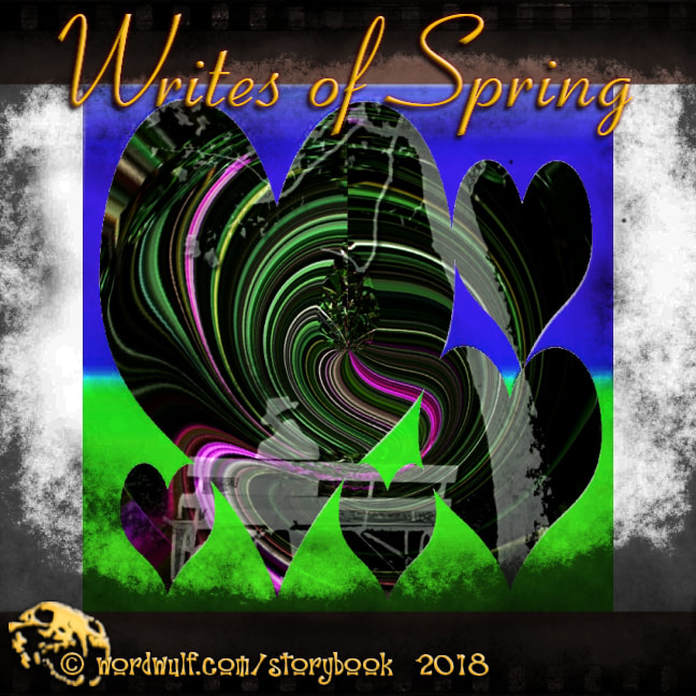
Dear Reader,
Looking into faces in the choir whose voices reach, pass us through, and touch the crowd, tone upon tone upon tone, delicious, the madnesses: Writes of Spring (3/21/2018) Love. Ah yes, what else is there in springtime, youth, the rosy blush of love on youths' faces. A poet would name it so and prelude to summer, the lustiest season of all. The rebirth of all things cries out regeneration, reaching to the sun, a smoldering fire. A scent of lilacs in the city and country hay alfalfa are stuff of sweet dreams, each purple shade an infancy of desire. Memories serve a dizzying array of disquiet at first hint of a springtime scent. First he wonders, will she speak; then, oh my, what will I say through a dribble of drool, sweet day. She wonders at him, silly boy. Her hand longs to be held. She blushes for him in his state of stutters. He concentrates on the top of her head, her angel hair, ‘til his lips make her name. She is all flustered then blushes a bit herself. Her hands long to be held, what else. Nearby, robins dance, strutting red breasts apart, heads bobbing, eyes on eyes, ebon orbs rapt; a primordial wreath hung between them. White moths flutter in mist haloes above swaying blades of grass. Gardeners guard darling sprouts array. Bicycle children stop to dap stones on still waters’ face. The voyeur falls off his bench. Our soon lovers go each apart to their homes where true madness begins. His dinner untouched, an unprecedented event; mother cannot imagine what has caused his vacant-eyed and feverish mien. She has experienced these phenomena but never outside her personal sphere. She lies him down, an ice-pack on his forehead and wonders the matter. Our girl is a-dither. She flits about, her wandering way a path butterflies might find cause to follow. Glass and mirrors give her pause, serve to verify what she saw in his eyes. Father sends her to her room, admonishes her to settle down, sits in his worry chair and wonders the matter. These three have marked time, the girl and boy, and poet voyeur. By some fantastic coincidence, the very next day, they are found in their same places. The young couple walks, her woman-girl voice a merry verse to the poet. He is portly come stately, his stage-prop a cane which he twirls a couple of times as he meanders a wander to follow. Her voice at once disarms the boy, challenges and forbids him. A spring breeze plays tickle with his hairline beads of sweat. He thinks maybe he should ask her but there is no room between her chatter. For this he is both thankful and confused. He bites his tongue while his hand takes a mind of its own. It actually touches her fingers. She responds with a squeeze and the next thing you know, they are walking hand-in-hand. This delicate, exotic, angel creature has, in a single gesture, answered every prayer, each, only, and all wishes of his heart. They stop as our aged poet drops his cane and claps his hands. Eye to eye, the three are one, a primordial wreath hung between them. Our poet bends to pick up his cane, back complaining. By the time he is erect, they are moving, swaying together in the dapple shade of budding trees. He finds a bench, a bit of shade for himself, squints his eyes, the more to see. They are face to face, hand to hand to hand to hand. She thinks, maybe a kiss, maybe a kiss my first. Our boy thinks the same, of course. Then realizes he has cut his tongue, a tiny bit of copper-warm blood, reassuring somehow. Will she come tomorrow, he asks. I have a walk each day, she confides. Me too, he smiles, same time? She is shocked to see herself so in his eyes, skips away. A flirting glance back, we’ll see. Our poet watches them go their ways, then bends to the scrawls in his notebook. A chuckle of youth borrowed slips past his lips. His cane in the crook of an arm, there is an uncharacteristic spring in his step as he returns down the path. No need to wonder the matter. He smiles to himself, imagining the words, the end he will write to this piece, the sharing of lovers, his wonderful madness, its' spiral web of time. ~Writes of Spring was first published in 2004 by Writer’s Room Magazine~ http://wordwulf.com/storybook Inquiries: [email protected] © 2016 artwork, words & music performed & conceived by property of ~tom (wordwulf) sterner~2016 © Midnight, Alexandria Virginia, May 23, 1861
A line of chained men, eighteen in all, struggle to find a rhythm in their leg irons which are chained to their waists to their manacled hands. Each wears a steel collar. A chain connects these so the men are forced to march in a line. They make a coffle. A fat unkempt white man and his young assistant lead the way, their whips dragging in the dust. The coffle is black and will offer no resistance on the march to the Slave Pens. They are the midnight parade giddy white folks won’t be bothered to witness. The overseer hands his assistant a coin and the key to the pen. “Jus lock ‘em in a cell. We’ll separate ‘em and spray ‘em down tomorrow ‘fore the buyers come. Write this down and take it over to Mister Birch: ‘I got me a dozen an’ a half stone breakers. They is long limbed and hard muscled. You wanna beat the sale, come see ‘fore ten tomorra mornin.’ The youngster pulled a pad from his pocket and wrote furiously. He stuffed the pad back in his pocket, fumbled the key into the lock. The door to the cells opened with a complaining screech. The old man laughed and scratched his groin. “Ya all boys get on in there. That bolt cannot be lifted from the inside.” The black men, eyes on the ground before them, shuffled into the dark stinking quarters of the Slave Pen. Here they would sleep and try to hold their water until morning came. Before the door closed behind them, one began to sing. His voice was low and syrupy, cracked like muddy water. He sang: Mister, set your whip down you done cut this body ‘way if I never lift that hammer oh-oh livelong day The younger white man banged the door with his whip. “You want I go whup ‘em quiet?” The fat man laughed. “I like your brass, boy. You go give Birch that note. Come on back an’ if they’s still singin’, I want you write down them words. I heard tell they’s some kinda unnerground railroad an’ them songs is signals to ol’ Abe Lincoln hisself. You bring me them darky’s words an’ I’ll tip a pint or two with ya. You go on now!” He gave the padlock a pull to reassure himself and turned to go to his quarters. A voice darker than prison followed him down. Mister overseer you done sold my children ‘way got me chained here to this hammer oh-oh livelong day Lord as my witness turn this body back to clay I will bury that old hammer oh-oh livelong day Momma, tell your children it don’t do no good to pray with your hands born to that hammer oh-oh livelong day “Man, it’s so dark in here, I can’t even see your eyes. Why you keep singin’ that ol’ song anyway? Ain’t nobody listenin’, ain’t nobody give a care ‘bout us.” The syrupy voice stopped. Chains rattled a bit and the singing man spoke. “You hear that fat man? Well, I got a bolt in me... that’s what I got and it cannot be lifted from the outside. It gets rusty, just like that one on the door. If I want to oil it all I have to do is sing. If you listened, you would know. There’s a tall man in a dark hat. He’s comin’ to break these chains and, when he does, I’m gonna fight in that man’s army. That’s my dream. I may never find my people but I can offer myself up. Wherever they are, they gon’ be free.” “You crazy, man. How’s that song go? Mind if I sing with ya? Maybe I could go fight in that army with you... They really let a black man shoot and fight...” But the singer was singing: Take a word to Mister Lincoln if he breaks these chains away I will fight them with this hammer oh-oh livelong day Next day the Union army surprised Confederates and captured the Slave Pen but it was empty except for one old man chained to the middle of the floor by the leg and he was singing: Four score and seven if a man is what he say he gon’ free me from this hammer oh-oh livelong day Mister, I’m the digger and that hole I made today is the last one; you can lay me oh-oh livelong day Inquiries: [email protected] © 2016 artwork, music & words conceived by & property of Tom (WordWulf) Sterner 2016 © 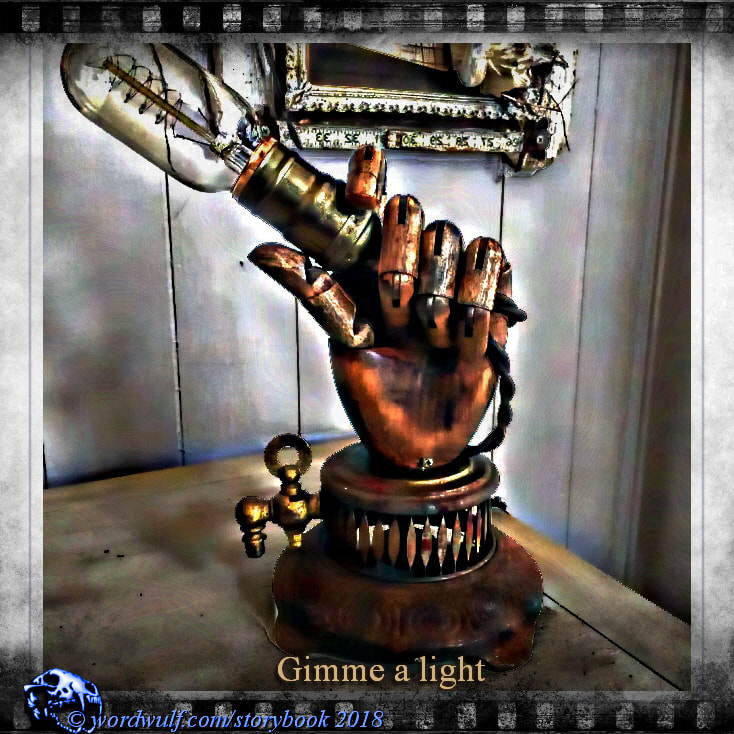 Gimme a Light - Six-Word-Story (2-7-2018) Gimme a Light - Six-Word-Story (2-7-2018)
|
Fists was surly that night which was unusual because he didn’t usually wax surly unless you got on the wrong side of him. You didn’t want to get on the wrong side of Fists. Oh no, you didn’t. He’d been out of sorts of late because Tinker, the guy who wrenched for him, disappeared a few days before. This, in and of itself, wasn’t all that unusual. Tinker was a drunk and had a liking for meth when in the process of doing what he liked most, diving to the bottom of a bottle. He showed up late for work more often than not, red eyes, puffy cheeks and shaking like a flea-bitten old dog. What was a bit unusual this time is that he hadn’t shown up at all. Oh, and Fists’ crank was gone too, a whole ounce, three thousand dollars worth after the cut.
Willy handed Fists a baggy with white powder in it. “Here’s a half ounce of mannitol, all ready for the cut. I got a commitment for half a ‘Z’, twelve hundred bucks.” “Later!” Fists said tersely. He tossed the bag on his desk. “We got something to take care of tonight. I need your help.” He handed Willy the keys to his Eldorado. “You drive. Take I-70 east to the Last Chance exit. We’ll get off there.” Willy took a deep breath, got in the Eldorado and backed it out of the garage. He waited in silence as Fists let the dogs loose and locked the shop. Willy’s mind was loco-looping, wondering what the hell was going on. He didn’t like the feel of it and wasn’t about to ask Fists any questions. He didn’t want to get on the wrong side of Fists. Oh no, he didn’t. The moon was around ninety-nine percent and Willy let the Cadillac have its head. Smooth as a baby’s butt at a hundred miles an hour. “Slow down!” Fists ordered, “You’re behaving like a pig magnet.” “Nice night for a ride,” Willy said offhandedly, thinking wistfully of his and Fists’ Harleys parked in Fists’ shop. “Not tonight,” Fist said, “Just drive.” Last Chance, Colorado, a blink into Kansas and you’d miss it. Willy followed Fists’ instructions, took the off-ramp and bump-bumped the Eldorado across the rough dirt road in a farmer’s field. “Stop and open the trunk,” Fists ordered. Willy breathed a little easier. Now everything was beginning to make sense, hideout guns and cash. That’s what was probably in the trunk. They were out here to do a deal, maybe take someone down. Fists wasn’t usually so closed mouthed about details. Willy turned the key and the trunk popped open. Fists stepped forward and smashed the trunk light out with the butt of his forty-five. “Should have taken care of that before,” he said. Willy blinked his eyes. Had he seen what he thought he saw in the instant of bright light before Fists put it out? Tinker, a bandana stuffed in his mouth and bound with cable ties. Fists gave him a nudge from behind and placed a set of wire cutters in his hand. “Here, cut him loose.” Oh, this wasn’t going well at all. Willy and Fists had talked about him making his bones but he wasn’t sure he wanted to go that far in and he sure as hell didn’t want to earn them by offing Tinker. Tinker was a drunk but Willy had a soft spot in his heart for alcoholics and drug addicts. His father and brothers were of that ilk. They usually hurt themselves more than anyone else. Willy reached into the dark cavern of the trunk. He had to feel his way to the plastic ties binding Tinker’s ankles and wrists, difficult because they were trussed up and linked together behind his back. “I hog-tied the sumbitch,” Fists offered. Tinker climbed out of the trunk. “Thanks, Willy,” he said sheepishly. “Get that pillow case out of the trunk,” Fists said to Willy. He took Tinker by the arm. “You come with me.” The pillow case had some heft to it, something metal clanking together suspiciously. Willy wasn’t about to risk a peek or put his hand in there. He followed Fists to where he had taken Tinker. They were silhouettes bathed in the moon of the still night, so dark and desolate a mantle of stars was visible. Moon or man could not own their light in the true domain of earth and space. Tinker was on his knees. Fists’ hands held his gun, arms stiff, a shooter’s stance, the barrel of the gun pressed tight against Tinker’s forehead. Fists twisted it a bit and a trickle of blood ran down the man’s face. “You regret lying to me?” Fists asked. Tinker groaned, an animal sound deep and lost inside. “Agh, yeah, I am..” “I got customers,” Fists said softly, tapping the pistol against Tinker’s head. “You lie to me and I lie to them. I don’t like that.” Tinker pressed his face into the gun. “I didn’t mean to. I’m no good. Just.. just.. you know.” “You been running your mouth in the bars,” Fists said. “Telling everybody you don’t care if I find you. Well, here I am.” Fists stood away, tucked his pistol into the back of his jeans. “Stand up and take your clothes off,” he ordered. Tinker struggled to his feet and began to walk round and round in a tight circle mumbling incoherently. “Undress that sonofabitch,” Fists said to Willy. Willy took a step forward. He reached out and touched Tinker’s arm. Tinker jerked away. “No, please!” he begged. “I know you’re pissed ‘cause I took your speed but I’ll pay you back, Fists. I promise! I’ll work for nothing, show up on time every day. Please!” “Did you hear me?” Fists addressed Willy. “Or was that cockroach making too much noise?” Willy grabbed the front of Tinker’s shirt. Tinker turned to run and the shirt ripped from his body. “Get ‘im,” Fists said softly. Tinker fell face first into the freshly plowed earth. Willy, a football player in his high-school days, had run him down and shoulder tackled him at the knees. He pulled Tinker up from the ground and marched him back to where Fists waited on the moonlit path. “What are you gonna do?” Tinker whined plaintively. “You won’t like it,” Fists chuckled. He pulled the forty-five out and pointed it at Tinker’s head. “But it’s better than being shot in the head. Now take your clothes off, all of them.” He leveled the gun, took a step forward, and nestled the end of the barrel into the spot between Tinker’s eyes. “A man should always have a choice. I respect that. You didn’t. This is your choice.” The distinct noise of the metallic mechanism of the pistol owned the moment as Fists pulled the hammer back with his thumb. “Last time. Take your clothes off.” Tinker pulled down his trousers. He had begun to choke and sob. His hands were shaking terribly and sharing some inconsolable rhythm with the gurgling sounds coming from his throat. “Pull down your boxers,” Fists ordered. Drool running from his mouth, Tinker was barely coherent, literally shocked out of his mind at the mere prospect of what might be about to happen. Fists nodded at Willy and he pulled down the man’s boxer shorts. Fists stepped forward and slapped him on his bare ass. “Ya know, Tinker, I could have had you the first day you screwed me around.” He waved his gun toward the moon. “I waited for that because I wanted you to see the full light of your mistake.” He chuckled. “And I need light to do what Willy and I are about to do about you.” Willy was almost as apprehensive as Tinker. He had no idea what Fists’ plans might be but hoped it wasn’t what he was thinking. He couldn’t do that, no way he could do that. He glanced at Tinker just as Fists slapped him hard in the chest. Tinker fell flat on his ass, a loud oomph of air rushing from him, forced out in a surprised gush. “Take his shoes off!” Fists ordered. “I want him butt-assed naked and we’re running out of time. We got things to do.” Tinker stood on his tiptoes, arms reaching for the sky. “Turn around,” Fists whispered. “Now bend over and grab your ankles.” “Oh, God, God,” Tinker moaned. “Now for your part.” Fists grinned at Willy. “Go clean him up. He done shit and pissed all over himself, then fell in the dirt, poor l’il guy.” Willy used the rag of Tinker’s shirt to wipe him off. “Make sure he’s dry everywhere,” Fists advised. “We gotta have ‘im tight ‘n dry.” Good God, Willy thought. This is some crazy shit. Any sympathy he had for Tinker was quickly dissipating as he began to wonder how he was going to handle the next few minutes of his life. “Hand me that bag,” Fists said. “Then go over and reach into the hidey-hole of my ride. We gotta get ready for the next part.” Willy returned with a can of WD-40. Fists smiled at him, dark and evil. He took the can of lubricant from Willy’s hand. “Good stuff.” He unscrewed a false bottom from the can, palmed a vial, winked and tossed it to Willy. “Have yourself a blast o’ that. Tell me what you think.” Willy held the vial up to the moonlight, squinted his eyes to better see its yellow/white powder contents. “Hurry up!” Fists said impatiently. “We don’t have all night.” The cap of the vial had a tiny plastic flip-out spoon which Willy used to scoop out some of its contents. He placed a finger on his left nostril, applying pressure to hold it closed, while he inhaled the powder up the other side of his nose. “Holy shit!” he exclaimed, extending his arm, offering the vial back to Fists. Fists waved him off. “Do the other side. I can’t have you runnin’ around in circles on me.” Willy laughed and loaded up the other side of his nose. Fists took the vial and quickly had a couple of blasts for himself. He stashed the vial back in the base of the WD-40 can and handed it to Willy. “Well, what do you think?” “Holy shit!” Willy repeated. “It’s great! I feel like someone’s taking the back of my head off.” He wiped his nose with the back of his hand. He held it up for Fists to see. “Bleeding like a stuck pig. That stuff’s a little raw.” “Yeah,” Fists agreed. “A brother of mine cooked it up to help cover up shithead here rippin’ me off. Made me a good deal and did it quick. Too quick maybe, he didn’t cure it right.” He glanced thoughtfully at Willy. “Hey, while we’re dealing with Tinker here, you be thinking about something to name this shit. It’ll smooth out some with that mannitol but it won’t take the yellow out. Shooters won’t like it one bit.” “Sure,” willy said, casting a worried sidelong glance in Tinker’s direction. “Go spread his butt cheeks,” Fists ordered, all friendliness gone from his voice. He was definitely in back to business mode. Here we go, Willy thought. Tinker jerked violently when Willy touched him. “Knock it off!” Willy hissed. “This will be over before you know it. You’re just making it worse with your bullshit.” Fists, in his directorial voice, intoned, “Turn his asshole toward the light.” Tinker shuddered as Willy arced his body around. “He has dirt on his ass,” Fists advised, “Wipe ‘im off again.” Willy picked the rag up from the ground and pushed it up and down Tinker’s butt crack. He heard Fists pick up the pillow case behind him, whatever was in it clinking and clanking in the still darkness. “Hold ‘im just like that,” Fists crooned. “We gotta start in the tight spots.” A tiny steel ball ding-ding-dinging against the inside of a tin cup. Willy’s mind jumped back to his poor-boy childhood, aggies and steelies, turf wars in the housing projects. He glanced back at Fists and just didn’t get it. The man was standing there casually shaking a can of spray paint as if he was preparing to prime a gas tank on his Hawg. Hold ‘im tight,” he said. He held the nozzle a couple of inches away from its target and began to paint Tinker’s asshole. His eyes were next and under his arms. Then came the pecker. Willy had to hold Tinker’s balls up because he was shaking and gasping and literally couldn’t get hold of himself. Fifteen cans of florescent green spray paint, that’s what was in that old pillow case. Fists stood back to admire his work. He had Tinker turn in slow circles, tried to talk him through a pirouette but the man was way past being able to manage such tricks. “Hey, Willy,” he said. How do you like that? Is that better than killing a man or beating him up or what?” “I don’t know,” Willy replied. “I just don’t know.” “Must be all right if I put one over on you,” Fists mused. “Did I miss anything?” “Hell,” Willie said, “That man is green everywhere but the bottoms of his feet.” “Good man!” Fists exclaimed. He gave Tinker a shove. “Sit down. You ain’t done yet!” He tossed a can of paint to Willy. “You finish ‘im off. Get the bottoms of those feet and in between his little tootsies. I’ll lay us out a proper line on the mirror before we send him on his way.” Willy was relieved to finish ‘im off as it were, glad it didn’t seem to require a bullet or baseball bat as finish ‘im off usually did. Tinker kept trying to ask him questions but Willy refused to engage. He had a feeling this was going to turn out okay, no dead guys or anything. “Go get yours!” Willy jumped at the sound of Fists’ voice. He stepped away and Fists ordered Tinker to his feet. If it was going to happen, now would be the time. While he was on the way to the car, sixteen steps, or when he was inside with the hundred-dollar bill straw giving himself another nose bleed. It didn’t though. He returned to Fists and Tinker and found Fists in a campfire stories kinda mood. “See,” Fists said to Tinker. He tapped him on the nose with a stiff finger. “Look at me when I’m talkin’ to you.” Tinker winced as he forced his eyes wide open, flinched when Fists’ hand moved. “Burns, don’t it?” Fists said. He pulled a tissue from his shirt pocket and dabbed at the corners of Tinker’s eyes. “You’re just skittish as hell, aren’t you?” he chuckled. “Farmers hereabouts been reporting flying saucer sightings longer ‘n we been alive,” Fists said in a conversational tone. “Most of ‘em pack iron for skunks, eagles, coyotes, any critter posing a threat to their critters. Don’t know how they’d react to a green man come to the door.” He looked off to the west. “Denver’s about forty miles from here,” he said. “That’s where Willy ‘n me are going.” You can too if you’d like. Thing is, me being a man of my word, I’ll kill your ass first chance I get.” He pointed to the east with a crooked finger. “Kansas that way, Dorothy, Toto, and all that shit. Scarecrows and tin men, maybe they’ll think you’re just another strange character jumped outa some writer’s brain.” Fists pulled out his pistol, made a big display of ejecting a shell and jacking a fresh one into the chamber. “One with your name on it,” he said to Tinker. “I’d get packin’, I were you. Make your choice.” Tinker went to Kansas. “Clean up this mess and let’s get out o’ here,” Fists said to Willy. “I’ll drive back. You drive too damned slow!” Interstate 70, speedometer pinned, four o’ clock in the morning, beatin’ the sunrise to Denver. “Well hell,” Fists pulled his fingers through his beard. “What we gonna call it?” He made a cluck-cluck sound with his tongue. “I wanna draw some connection to tonight’s events but not directly and I want something catchy, some snazzy assed thing to draw in the shooters. We gotta move this stuff quick to cover our ass.” Willy stared through the windshield, mesmerized by the predawn silhouette of the Rocky Mountains against the sky. He glanced across the car at his friend, green fingers tapping out a beat with ZZ Topp, “Easing down the highway in a new Cadillac.” “How ‘bout ‘Florescent Horizons’ Willy said dreamily. “Goddam if that ain’t it!” Fists slapped the steering wheel with the palm of his hand. He flipped the vial across the seat. “Glad you was with me tonight, Willy. Let’s get to shakin’ and bakin’! We gon’ make some Florescent Horizons.” And they did, down the road, singin’ with the radio, “I’m bad, I’m nationwide!” http://wordwulf.com Inquiries: [email protected] © 2018 artwork, music and words conceived by and property of Tom (WordWulf) Sterner 2018 © Simple things in life escape me at times. My alcoholic father was a roofer. He advised me that a working man ought to sit down to pee whenever he has the chance since he stands all day to make the other man money.
Until We Don’t I was twenty-two years old standing at the urinal in my favorite watering hole, the Suzy-Q Bar and Grill. I had been taught that particular lesson most boys learn in school. Those that don’t, should. You stand straight up to do your business, make necessary adjustments to the left or right to protect the privacy of your Willy-Worm, Johnson, Peesqueeter, penis, whatever you wanna call it. There is usually a mirror above that white porcelain-stainless steel trough. One must be careful to give no indication that he waited too long and it feels so good to finally take a pee. Well, this particular time an old man a couple of stands away was obviously interested, and too damned interested in my business. “Don’t worry, kid,” he grinned, “I’m just admirin’ yer pressure. I had pressure like that when I was a kid.” I didn’t take the time to knock the dew off my lily, give it the customary three shakes, or anything else for that matter. I put it away and got the hell out o’ there. Sittin’ in the basement bathroom of my home, yeah, I sit down to do it now, I listen as my ten-year-old grandson enters the bathroom upstairs and jus’ lets ‘er rip. In a time-stop instant, I understand what that old man was talking about. He’s long gone with all my whiskey bar drinking pals. Seems like we just don’t know what we got until we don’t. http://wordwulf.com Inquiries: [email protected] © 2018 artwork, music and words conceived by and property of Tom (WordWulf) Sterner 2018 © A man on the road usually doesn’t have much in the way of money and possessions. What he seeks is positive energy, vitality of spirit, a predisposition toward hopes and dreams, the hunger and willingness to share them.
The Highwayman He carries dreams in a bucket. It is shot through with holes and leaking, splashing the tarmac, shoulder of the road, in liquid arcs, tiny streams crisscrossing. He is a sight to see with his backpack and bucket, feet tripping forward, a staccato march toward what is left in the pail, nonchalant as regards what has been spilled along the way. He has half a sandwich left over from a stop at a Seven-Eleven, a battered army canteen full of cheap red wine, a ten-dollar bill stashed in the sole of his shoe. Round and round, he swings the bucket. The sun highlights a circle silhouette, the arc of his throw, reach of his dreams. Both hands on its handle, he flips it over, sits down on top of it, opens the canteen, takes a conservative swallow. A crow shines blue/black in the tree of his shade. Caw-caw, it speaks to him in its ancient voice. The highwayman laughs, taps out a finger-beat percussion on the side of his bucket-seat full of dreams. He begins to hum and the bird cocks its head. Their eyes meet; they are birds of a feather. The day passes and the bucket fills with bits and pieces. The highwayman sorts through lies, truth, half lies delivered in steps through holes in his mind. He waves off a ride in a Coupe de Ville, climbs into the back of an old rusty pickup truck with a lovely crowd of Cherokee children. They smile shyly with their dark eyes. He stares at his shoes and smiles back. From the bottoms of their eyes, they are birds of a feather. The children dig into his bucket with curious racoon-like hands, leave more than they could ever take. He insists their father, the man driving the truck, accept the ten dollars he has pressed into his hand while giving it a firm thank-you and shake. The highwayman sets off down the shoulder of the road to share and refill his bucket of dreams. He offers a wink to the day, a song in the voice of the crow. His step is lighter without the weight of the ten-dollar bill on his mind. http://WORDWULF.com/STORYBOOK Inquiries: [email protected] © 2018 artwork, music and words conceived by and property of Tom (WordWulf) Sterner 2018 © It weighs hundreds of pounds, the bawling creature. It is her chosen task to mother it. She imagines herself a ranch witch, feeding a motherless dragon. Death is a new wind, a chilling reminder, ashes strewn by a zephyr.
Each Side of Dawn Dawn has nothing to do with it. It is the nature of the woman to sleep. Coffee cup warm against her lips, she looks through the dark square of window where soon morning will appear. The cards are on the table. He visited her in a dream, told her to go ahead and pick them up. She sips her coffee and shakes her head. Her lips form a single word, “No.” His cow-dog nudges her with its nose. “Oh, Charley.” She gets up from her chair, opens the kitchen door and he goes barking across the yard. She daydreams a bit, lonely but satisfied with her chosen space. At the sound of Charley’s barking voice, she rises and goes to the sink. Her hands attend the busy work by themselves. Her mood invites introspection. “I’m too old to be a ranch wife.” She is shocked by the sound of her own voice. Her mind joins her hands at work. The calf is bellowing in octaves, “Mother!” like one of the eight of her children, all grown and gone away. Its Mother song pleads, its hunger song. “Charley, stop it!” She swats at the dog she would never strike. Having herded the calf, Charley now attempts to herd her as she steps into the yard in the dark, in the still dark of morning. She hears the man-voice she will hear no more. “Charley, leave her alone! Get in here now!” A sad smile reaches her lips as the maverick calf, the motherless thing, makes its feeding sounds, suckles the rubber nipple held sure by her hands. ‘They purr like giant cats,’ she thinks ‘and cry like wounded children.’ The bottle is empty. She pulls it out of the calf’s mouth. It comes free with a thwop. The calf bellows, “moo-aw.” “That’s all for now, Blueberry.” She places her free hand on the calf’s broad forehead, hides the empty bottle behind her back, pushes him gently away. As she turns to go in, the sun peaks over the horizon. A single ray of purple light gives itself over to her eye. “I know, I know,” she murmurs, “I am a widow now.” She returns to the kitchen, gathers his cards from the table. “And I don’t play cards.” The square patch of lawn he planted for her is brown, the Wyoming drought, his ashes lain fresh upon it. She damns herself her wishes, to finally be left alone. A twinkle of life in her eye, dawn has nothing to do with it. Each Side of Dawn was published by Boheme Magazine 2005 http://wordwulf.com Inquiries: [email protected] © 2018 artwork, music & words conceived by & property of Tom (WordWulf) Sterner 2018 © Giving back, natural as the tree.
In the park with my two-year-old granddaughter, Eden. She saw a pinecone, picked it up, and offered it back to the tree. France
June, 1905 “Mister Langolour, I must say your sang-froid attitude distresses me. While I find it courageous of you to face the impending hour of your death so bravely, one must wonder... are there issues of sanity..” Langolour reached through the bars of his dank prison cell, touched the other man’s ruffled cuff. “Doctor Brulle... please, I have made my peace, exhausted my defenses. There are those who see me as a threat to this regime. I suppose I have been in my small way. They have been successful in their efforts to discredit me and will now have me put down. Surely it is not insanity to finally accept one’s lot, to decide to do one last worthwhile thing with one’s life.” Doctor Brulle patted the man’s hand, a decided professional affection in his touch. “Langolour, listen to me, man. I have studied the facial expressions and physiology of guillotined persons for some time. I have looked into their eyes. That damned machine is an abomination. While I find your demeanor intriguing, I cannot see that witnessing your demise would further the cause, the necessity of having the guillotine and all attached to it removed from out society.” “Witness,” Langolour whispered. “I have as my last right a plea for witness. I have chosen you, having read your work and studied your cause. I must charge you to witness.” “This is a most disgusting business!” Doctor Brulle spat. “Furthermore, I have never spoken to a victim pending the blade. You are asking too much of me, supposing you are in some way different from others I have studied.” Langolour pulled his hand back through the bars. “I am sorry my composure discomfits you. Those you speak of were already dead, borne to the apparatus in fits, mumbling incoherent babble. I intend to approach this event, my faculties intact. If you refuse to stand witness, you are doing both myself and your cause a grave injustice. My dying will provide proof of awareness, that there is anguish and pain, punishment beyond the severing of the head.” Doctor Brulle regarded the condemned man for a moment, languishing in the squalor of his cell. A rat scurried along the wall behind Langolour, disappeared into a pile of rotting straw. The doctor closed his eyes, blew a snort of air through his nostrils. “Langolour, you do so distress me. I believe you would have been a good man to know. It is with great sadness that I agree to your appointment as witness. I never imagined myself being in such a position as this.” “I am through with sadness,” Langolour replied. “You have done me more service than you know.” Having said, he stepped back, lay down on the straw and closed his eyes. June 28, 1905... 5:15am A rattling of chains, fumbling through keys, unmistakable tumble of the lock... sounds a prisoner hears. Langolour stood and faced his heavily armed entourage. “Gentlemen, if you please, I appreciate the escort. This is a walk I would rather not make alone. Do a condemned man a favor. Allow me to walk among you unencumbered to my deliverance. In the name of mercy, forego your whips and chains. I go willingly, with no malice toward you, the mechanics of your task.” The Captain of the Guard stepped forward, whispered gruffly in Langolour’s ear, “Behave yourself then. For appearances... hold these to yourself.” Langolour gripped the manacles in his hands, nodded his thanks to the Captain. “Take me as you will. I am ready.” The sun was a half circle on the horizon. The vertical guides of the guillotine cast a shadowy cross on the bloody platform. ‘Odd,’ thought Langolour, ‘It seemed so much larger from the cell window during my death wait.’ The rising sun glinted off the blade suspended at the apex of its supporting towers and Langolour squinted his eyes. The Crier began a formal reading of charges against him. Langolour followed the drone of the publican's voice. It led to the eyes of the onlookers, only a handful at this early hour. Relief flooded through him as he spotted Doctor Brulle, front and center in the witness chair, head and eyes even with the base of the guillotine. A hand pressed into his back, pushed him forward, and Langolour realized the accusations and pronouncement of punishment were done. The chains echoed loudly through his brain as the Captain went through the motions of removing them. Hands on each side assisted him into a face-down position on the feeder platform. His breath leaked from him in small gasps as straps were tightened to hold him firmly in place. He smelled the copper of his own blood as a hand from behind pushed his head down and clamped it to a leather threshold the other side of the line of his life. Langolour was attempting to sort through the cacophony of sounds around him, a ringing in his head and the voices of birds, when gravity gave its song to the blade. Was that a basketful of the heads from yesterday just before him on the platform at Doctor Brulle’s feet? His head pitched forward and landed on its severed neck atop the heap. His eyes blinked rapidly against his will and his lips attempted to say, “Is it done?” as he looked into the stricken face of Doctor Brulle. Overcome by weariness and heaviness of body beyond comprehension, he felt the lids of his eyes descend. “Langolour, can you hear me?” A voice beyond bird-speak. He opened his eyes, drew them into a tight focus of Doctor Brulle’s face. His lips trembled, “Is it done then?” The curtains of his eyelids pulled themselves down and blessed darkness made its creep. “Langolour... Langolour, look at me!” Those brave eyes stood the test and Doctor Brulle took a step back. “You’re the bravest damned man I ever met,” Langolour said with the voice of his eyes as he gave himself over to the weight, into the folds of death. Doctor Brulle sniffed loudly, wiped a tear from his cheek with his ruffled cuff. ‘Twenty-eight seconds duration,’ he noted on a pad. ‘Aware and communicative - eye contact twice’. He gazed upon Langolour’s dead countenance. “You’re the bravest damned man I ever met.” http://wordwulf.com Inquiries: [email protected] ©2018 artwork, words & music performed & conceived by property of ~tom (wordwulf) sterner~2018© 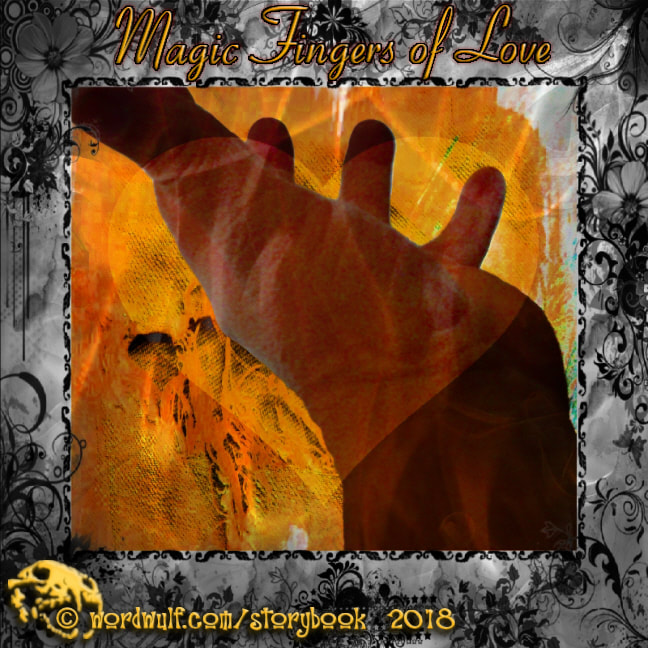 Magic Fingers of Love (4-26-2018) Magic Fingers of Love (4-26-2018)
“Catch me Daddy! Catch me if you can!” Always good for the chase, he dashed after them, those beautiful boys and girls. Arms stretched, fingers reaching, he touched the back of their feathery hair. Then, as if by magic, they twisted and turned, caught a burst of speed, and escaped his grasp.
One by one, the magic disappeared as they came of a certain age. His reaching fingers filled with air. He stopped to catch his breath (the only thing, by the way, he ever did manage to catch). Truly outrun and outmaneuvered, he laughed as if nothing had changed. “Next time!” he declared and, sure enough, next time he’d get a wisp of hair-touching close then off they gamboled, under the power of a bit of daddy magic. They have all grown now, past the magic of the daddy chase. He ruminates, wonders when the moment came with each of them, when daddy’s magic passed from his fingers into their hair. He sure can’t catch them now, probably never could. Magic Fingers of Love was published by Writer’s Room Magazine 2004 http://wordwulf.com Inquiries: [email protected] © 2018 artwork, music & words conceived by & property of Tom (WordWulf) Sterner 2018 © Her hair is a web come falling
tiny knot spiders withering down She remembers dancing the Charleston big bands when music was music Her hands, graceful birds fluttering at her sides she turns slowly, eyes half closed, drifts off into space searching for the face of her lover gone, half a century gone She lifts a tissue to her lips protection against the poison city No more men in her life, she declares having outlived husbands one and two Children are pulling clumps of grass from the yard “Stop that!” she admonishes in her frail voice It reaches them and they blink at her, wide-eyed One small tongue wags at her; others soon follow She takes a halting step down the stair points and shakes a trembling finger at them Sitting on the top step, I prepare to catch her Her bones pop and she plops down next to me “They’re not supposed to be here,” she groans “This was to be an ‘adults only’ building.” Yet the past fourteen of her eighty-seven years have been spent here witnessing the passing of children She is quick approaching adult death fearful and awestruck, alarmingly aware, stunned Last year, after the chemo, the radiation her voice died and she ceased to sing I enjoyed her songs, the lady next door She was wont to sing in the morning and the afternoon her voice a god thing sweet echoes of a life lived good and true I seldom understood the words of her songs The meaning was clear as the pealing of bells the sound of her voice, full extension of her being a lifted appendage of emotion Sometimes when I came home from work I lingered on the balcony porch eager to hear a single note, a mumbled syllable the crooning sound of the lady’s voice a bridge between time past and worlds unborn Lately she has been quiet, a requisite sorrow upon her simple, absolute, more powerful than her song I find myself a place, kneel and say a prayer ‘Take this burden from her heart; fill her spirit with joy Lend it full voice in the end as before shadows set to dance when the sun disappears they are one become independently wrought created then torn from the face of god’ Yes songs, they are the language of years hummingbirds, voices of new children, the lark violence of boom cars and madmen honking slick women children writhing the coming tide Will their aged faces remember the words bodies turn and eyes half close reminisce the quick step pirouette of dead husbands fathers lost and a brace of children She tries to stand and I help her too fast, her bones creak and complain The sun breaks down on dying root clumps of grass pale in the afternoon Faces of children fathom, so does she the dawn of first summers and winter glow I offer her a trade, a wink for a tear She hums a moment; her lips smile down She adjusts her wig, dignity reestablished I witness a vanity of ages The children laugh, create metal warp sounds slapping and twisting the sign: ‘KEEP OFF THE GRASS’ I am keenly aware in the moment, the sameness of grace hers and the children’s faces They are beautiful and must each the other learn where death walks, life dances afraid Swan Song was published by Skyline Literary Magazine 2002 http://wordwulf.com Inquiries: [email protected] © 2018 artwork, music & words conceived by & property of Tom (WordWulf) Sterner 2018 © |


